
Ulli Diemer — Radical Digressions
Scrapbook #1
- The Red Menace #1 published
- Seven News: My first issue as editor
- Red Menace #2
- Red Menace #3
- Red Menace #4
- Red Menace #5
- Connexions Digest - Volume 7, Number 4 - Housing
- Connexions Digest - Volume 8, Number 1 - Women and Men
- Connexions Digest - Volume 8, Number 2 - Toward a New Economy
- Connexions Digest - Volume 8, Number 3-4 - Native Issues
- Medical Reform Group newsletter - January 1984
- Connexions Digest - Volume 9, Number 1 - Energy
- Connexions Digest - Volume 9, Number 2 - Rights and Liberties
- Connexions Digest - Volume 9, Number 3 - Housing
- Connexions Digest - Volume 10, Number 1 - The Arts and Social Change
- Connexions Digest - Volume 11, Number 1
- Connexions Digest - Volume 11, Number 2
- Connexions Digest - Volume 12, Number 1
- Connexions Digest - Volume 12, Number 2
- The Connexions Annual - A Social Change Sourcebook - 1989
- Connexions Digest Number 50
- Connexions Digest Number 51
- Connexions Digest Number 52
- Connexions Digest Number 53
- Connexions Digest Number 54
- Connexions Annual 1994
- Notebook 1
Articles Lists
- Selected Articles
- Articles A-Z
- Articles in English
- Articles in French
- Articles in Spanish
- Articles in German
- Articles in Other Languages
- RSS feed
- Subject Index
Selected Topics
- Alternative Media
- Anarchism
- Bullshit
- Capital Punishment
- Censorship
- Chess
- Civil Liberties
- Collective Memory
- Community Organizing
- Consensus Decision-making
- Democratization
- Double Standards
- Drinking Water
- Free Speech
- Guilt
- Health Care
- History
- Identity Politics
- Interviews & Conversations
- Israel/Palestine
- Libertarian Socialism
- Marxism
- Men’s Issues
- Moments
- Monogamy
- Neo-Liberalism
- New Democratic Party (NDP)
- Political Humour/Satire
- Public Safety
- Safe Spaces
- Self-Determination
- Socialism
- Spam
- Revolution
- Trotskyism
Snippets
If we think back a few years, before Gorbachev, then we remember an Eastern
Europe which appeared to be, from the inside as well as the outside,
an immovable monolith. The system of social control, while in some
ways crude by Western standards, was total and relentless, and few
saw any hope of ever achieving change. Only a tiny minority opposed
the regimes, and they suffered for it. Yet almost overnight, those who but a historical moment earlier had
no hope or thought of resistance or rebellion suddenly came together
in their tens and then hundreds of thousands, and the powerlessness,
passivity, and resignation of the people turned almost instantly
into their opposites. The truly remarkable victories they have achieved should inspire us
in our own efforts in working for change in the West and remind
us that fundamental change is possible even against formidable odds.
Looking for Democracy
The hidden meaning, the real essence, of this slogan, is the belief that it
is neither possible or desirable for two or more ethnic or language
groups to live together in one country. I cannot imagine a more
pessimistic and less socialist point of view.
Thinking About Self-Determination
We undermine efforts to turn violence into a social taboo when we indiscriminately label every objectionable behaviour, including thoughts and remarks, as "violence."
Combatting Violence'
Blogs & Notes
- Latest Post
- Notebook 10
- Notebook 9
- Notebook 8
- Notebook 7
- Notebook 6
- Notebook 5
- Notebook 4
- Notebook 3
- Notebook 2
- Notebook 1
- Scrapbook
Compilations & Resources
- Connexions
- Other Voices newsletter
- Seeds of Fire
- Alternative Media List
- Manifestos & Visions
- Marxism page
- Socialism page
- Organizing Resources
- People’s History, Memory, Archives
- Connexions Quotations page
- Sources
- What I’ve been reading
- What I’ve been watching
- Miriam
Words of Wisdom
- Revolution is never practical until the roar of revolution strikes. Then it alone is practical, and all the efforts of the conservatives and compromisers become the most futile and visionary of human language.
- – James Connolly
Snippets
Luxemburg was the leading exponent of a Marxism in the spirit of Marx. One indication of this, paradoxical at first glance, is that she was one of the very few leading Marxists who did not treat Marx’s writings as holy writ.
On Rosa Luxemburg
The idea that the right to democracy logically means shared and direct participation and control by all those affected by decisions is dismissed as impossible and probably "subversive." Thus the right to vote becomes the denial of the right to participate more directly in
decision-making.
Rights and Liberties
Ulli Diemer’s Scrapbook
Publications I have edited or published & other miscellania
The Red Menace #1 published
February 1976 - #
The first issue of The Red Menace, a newsletter published by the Toronto Liberation School, appears in February 1976. I am a member of the founding editorial collective.
The first issue, 52 pages in length, has several articles about a recent Popular Education Conference hold in Toronto. Members of the Toronto Liberation School played an important part in organizing the conference, and this first issue of The Red Menace reflects that, with four articles giving different perspectives on the conference. The differing views reflect our vision of what we want The Red Menace to be, namely a publication which encourages critical analysis and debate within a broadly libertarian socialist perspective.

In addition to the articles about the Popular Education Conference, the issue also contains a lengthy article by two members of the Toronto Liberation School about their experiences organizing in a small town in Ontario, an article about the revolution in Portgual, and an analysis of the wage and price controls introduced by Pierre Trudeau’s Liberal government.
The introduction, which I drafted based on input from from other members of the collective, outlines our reasons for launching the publication. It begins “The Red Menace is published by Toronto Liberation School. Toronto Liberation School is a group of libertarian socialists, independent of any political organization, who see a need for a broad range of educational and cultural activities that contribute to transforming this society. We see the constituency for these activities as all those people who have become concerned about their lives, their communities, and the problems of this society and its institutions; people who have become activists at the workplace or in the community, for their needs and rights, or around national and international issues; people struggling for their liberation.”
We go on to say “we do not intend that this newsletter reflect a single political line, not only because we do not believe that a coherent and comprehensive ‘correct line’ exists but more importantly because we believe that a necessary condition, and pre-condition, of libertarian politics is the widest and most open discussion. We cannot consider any questions closed. And certainly there will be many times when we print contributions that we do not ourselves agree with....
The project we are committed to is that of developing a libertarian marxism which takes as its project the critique of the totality of human life in capitalist society....
Based on this critique, we are committed to developing a revolutionary politics that is liberatory in the fullest sense of the word. Capitalism is a totalistic system of oppression that invades all areas of life: socialism must be the overcoming of capitalist reality in its entirety, or it is nothing.... a socialism that is partial can only become a parody of the liberatory ideals it espouses. The disastrous results of a ‘socialist’ movement that equated socialism with nationalization of industry speak clearly enough in this regard.
Our belief in a total revolution impels us to underline the assertion that Marx made the first point in the statement of principles of the First International: ‘The emancipation of the working classes must be achieved by the working classes themselves.’ ... Social liberation, human liberation is a process that must go to the root. It cannot be decreed. Nor can it be achieved without the participation of the vast majority of the population. A collective project, and therefore individual, as well, socialism must be self-liberation in every sense of the word.”
See The Red Menace #1 here.
The Red Menace is archived on the Connexions website. The home page for the Red Menace is here.
Keywords: Community Organizing – Libertarian Socialism – Organizing for Social Change – Popular Education – Portugal – Toronto Liberation School
Seven News: My first issue as editor
Seven News Volume 7, Number 11- November 20, 1976 - #
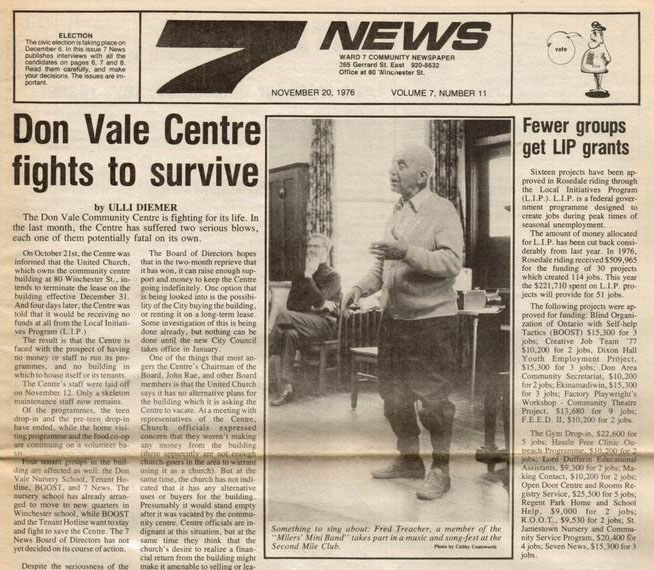
In November 1976, I became the editor of Seven News , a non-profit community owned newspaper published in Toronto’s “Ward 7“. Ward 7 was the area east of downtown, extending from Sherbourne Street in the west to Logan Avenue in the east, and from Lake Ontario up to Bloor Street and Danforth Avenue. Before I became editor, I had been working at Seven News for a year prior to this, as volunteer co-ordinator and business manager.
Seven News has been digitized: all back issues, along with background articles and other materials, are available online.
It was a challenging time to take over as editor. The paper was in financial difficulty, with advertising not enough to carry the paper on its own, and fewer government grants available to make up the difference. At the same time, we were facing the loss of our office at the Don Vale Community Centre because the owner of the building, the United Church of Canada, had announced that it was going to sell it off. The first issue I edited, published on November 20, 1976, featured a front-page story on efforts to keep the community centre from closing. Another story reported that Seven News was going to be receiving a small Local Initiatives Program (LIP) grant which would allow us to pay the three staff for several more months.
I continued as editor for more than five years. My first issue, the November 20, 1976 issue, is available here.
Further Reading:
Seven News: The Story of a Community Newspaper, by Lisa Horrocks
Index of Seven News issues published 1970 - 1985
Seven News articles by Ulli Diemer (a selection)
Seven News - December 4, 1976
Seven News Volume 7, Number 12 - December 4, 1976 - #
The December 4, 1976 issue of Seven News contained two articles on cutbacks to Local Initiatives Program (LIP) funding. LIP helped many non-profit community groups, including Seven News, to survive, and the cutbacks were s serious challenge for many groups. A separate article asks why projects from Regent Park were shut out of the LIP funding that was approved. Another story reports the completion of the once-controversial Dundas-Sherbourne non-profit housing project. Howard Huggett offers advice on preparing for retirement, which he says should be seen, not as an escape from life’s problems, but “a new situation with new problems.”
See the December 4, 1976 issue of Seven News here.
The Red Menace #2
Summer 1977 - #
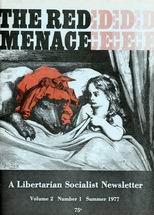
The second issue of The Red Menace was published in the summer of 1977. I wrote a couple of articles for this issue. One of them is titled What is ‘Libertarian Socialism’? It’s one of three articles in this issue which attempt to explore the meaning of “libertarian socialism,” the term that we in the Toronto Liberation School (later renamed Libertarian Socialist Collective) have chosen to characterize our political perspective. My article is really a set of theses outlining my view of the broad principles of a libertarian socialist perspective.
My second article is about the recent conflict at the Bain Avenue Apartments in Toronto, which pitted one group of tenants, affiliated with the Wages for Housework group, against the majority of tenants, who were attempting to take control of their badly run apartment complex and turn it into a self-managed housing co-operative. I had orginally become aware of the conflict at Bain in my role as editor of the local community newspaper, Seven News. I wrote a couple of articles for Seven News describing the conflict and positions taken by the two sides. Both sides liked my Seven News articles: in fact, both sides handed out copies of the Seven News articles in their door-to-door canvassing. However, the more I saw, the more I came to see the Wages for Housework group as manipulative and undemocratic. My article for The Red Menace, Bain Co-op Meets Wages for Housework, described what had happened at Bain and criticized the behaviour of Wages for Housework. (Wages for Housework then wrote a reply which we published in the next issue of The Red Menace.)
This issue of The Red Menace also included an article by Elaine Farragher about working in libraries, titled A Tale of Two Offices. The article reflected our commitment to featuring articles about workplace experiences. Also in this issue were some humourous pieces, including a fake interview with Prime Minister Pierre Trudeau satirizing his indifference to the unemployed, and an In Memoriam page for Mao Tse-Tung [Mao Zedong], the recently deceased Chairman of the Chinese Communist Party. Our ‘tribute’ to Mao recalled his collaboration with the United States while the U.S. was bombing Vietnam, his top-down regimented version of ‘socialism,’ and his contempt for workers’ democracy.
The Red Menace #2 is available as a PDF
The Red Menace #3
May 3, 1978 - #
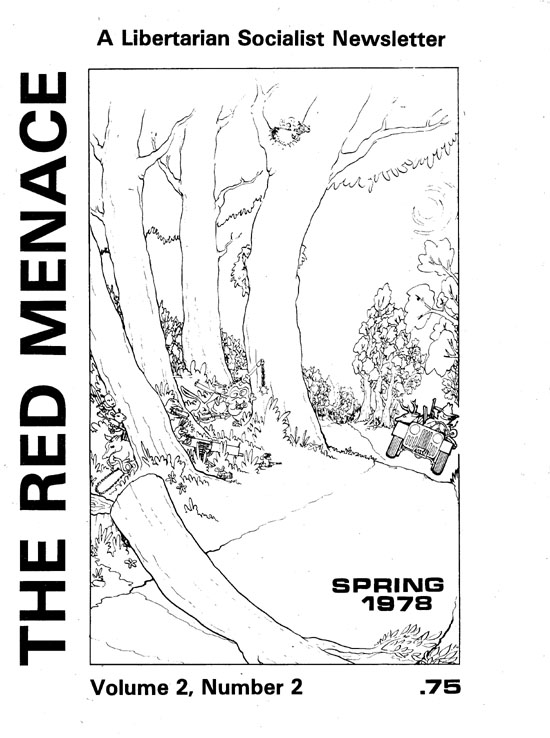
Volume 2, Number 2 of The Red Menace appeared in May 1978. My article Anarchism vs. Marxism appears in this issue, along with a companion article, Bakunin vs. Marx. I argue that anarchist critiques of Marxism typically reveal a lack of knowledge of what Karl Marx actually wrote, resulting in sterile denunciations of a straw-man opponent. There are other articles in this issue on the challeges facing the libertarian left, including "The End of Dialectical Materialism: An anarchist reply to the libertarian Marxists' and 'Some thoughts on organization - What type of organization should anarchists, libertarian socialists and libertarian Marxists be working towards?'
The issue is packed with articles and illustrations about a diversity of issues, including another workplace experience article on working in an office, a story about Radio Alice, a radical radio station in Italy, and even an artcle (included for the sake of encouraging debate), arguing that socialists should work with the New Democratic Party (NDP) to try to move it to the left.
I've also got a couple of shorter bits in this issue, including one on the misue of language on the left.
The Red Menace Volume 2, Number 2 is available as a PDF
The Red Menace Volume 3, Number 1
Winter 1979 - #
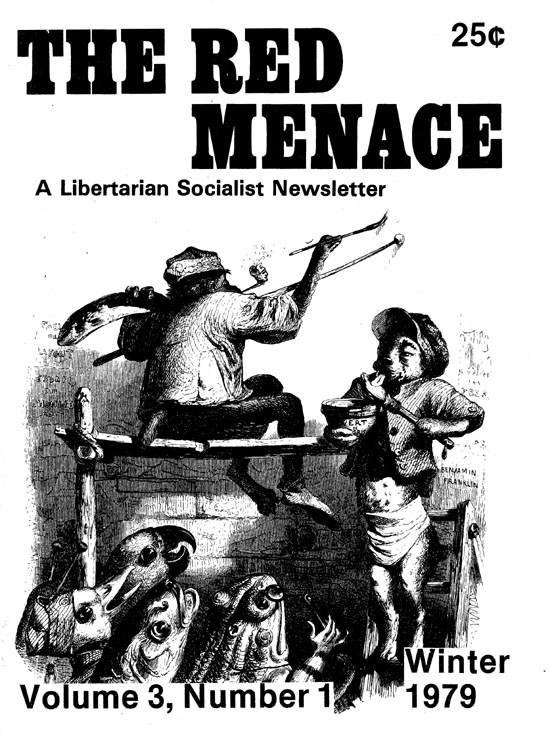
Volume 3, Number 1 of The Red Menace was published in early 1979. The issue featured a Political Statement of the Libertarian Socialist Collective. Liberation Socialist Collective was the new name we had adopted for the Toronto Liberation School. The statement was intended to be a draft version of a statement setting out our views, to be revised after further discussion and after input from readers of The Red Menace. In the event, we never managed to produce a revised version before The Red Menace stopped publishing in 1980.
The issue also contained close to twenty other articles, as well as a number of letters responding to previous issues.
Among the articles in this issue was another in our series about workplace experiences, this one about Working in a Supermarket. an article on censorship and repression in West Germany, a piece on science fiction, another questioning the justification for hierarchies of salaries and income, and a critique of “neo-primitives,” one of the incarnations of anarchism that was fashionable at the time. We also reprinted an 1871 interview with Karl Marx, focusing on the goals and organizations methods of the First International.
I had several articles in this issue, one about radical newspapers, another one about parapsychology, and another about the left’s use of language.
The Red Menace Volume 3, Number 1 is available as a PDF
The Red Menace Number 5
Summer 1980 - #

The fifth issue of The Red Menace appeared in the summer of 1980.
Included in this issue were two reports from the Soviet Union and Eastern Europe, one a first-hand report, the other a more theoretical look which also looked at political humour in Eastern Europe. An example:
Q. What is it when you have too much food in the country and no food in the city?
A. A Bukharinite right deviation.
Q. What is it when you have all the food in the city and none in the country?
A. A Trotskyite left deviation.
Q. What is it when you don’t have any food anywhere?
A. The correct application of the party line.
Also in this issue: an article on the role of women in a revolutionary movement, articles on terrorism, fashion, and prostitution, and different viewpoints on anarchism and Marxism, including one by me responding to Sam Dolgoff’s article in the previous issue.
This issue of The Red Menace was the last to be published.
The Red Menace Volume 5 is available as a PDF
The Connexions Digest - Volume 7, Number 4 - Housing
December 1982 - #
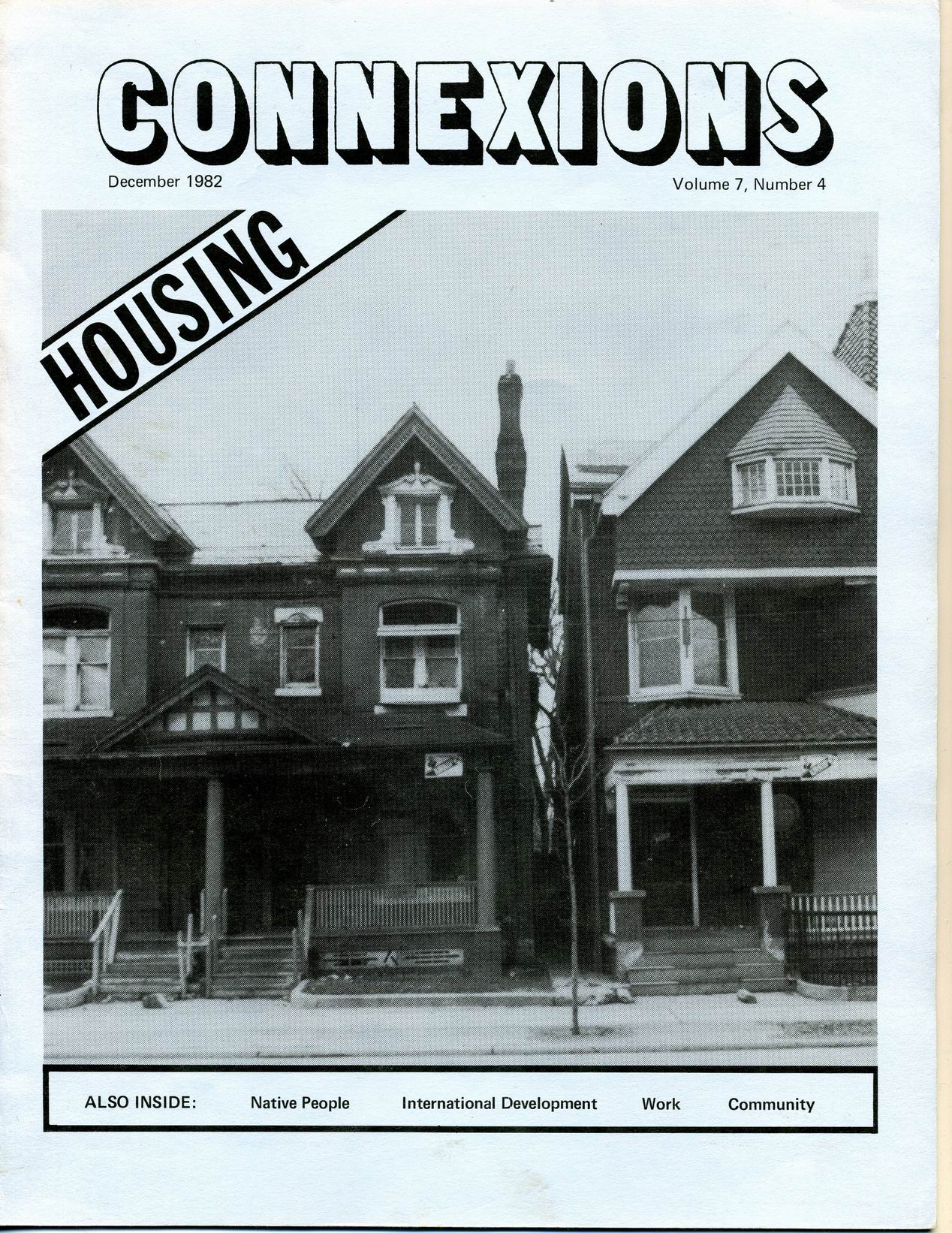
I started a new job as co-ordinator of the Connexions project in August 1982. Connexions produces a quarterly periodical, also called Connexions (subsequently The Connexions Digest). Connexions is a collective project, found in 1975, with the collective typically comprising eight to ten people, who together run the project and do the work of preparing each issue of the publication. I am the only paid employee.
The first issue I work on is a theme issue on Housing. In addition to spotlighting groups and resources on housing, the issue also features materials on International issues, Energy, Native Peoples, Racism, Community, and Labour. The issue also contains an annoucement informing readers that, for budgetary reasons, Connexions will be appearing four times a year, instead of the previous five.
Here is a scanned copy of the the first issue of the Connexions publication that I worked on: Volume 7, Number 4, published in December 1982.
The Connexions Digest home page on the Connexions website, listing all the issues that were published, is here.
The Connexions Digest - Volume 8, Number 1 - Women and Men
Spring 1983 - #

The Spring 1983 issue of Connexions is out: with Women and Men as the theme. Here is a scanned copy.
The introduction to this issue began with the observation that “in today’s climate of economic and political retrenchment, the gains achieved by the Women’s Movement are in jeopardy. As our readers have suggested, there is a critical need at this time to re-affirm the strength and impact of our collective actions.”
It goes on to say that “There are many forces in contemporary Canadian society that reinforce sexism in public and private spheres of life, and which socialize our children into that system. Our economic system is based on competition, winners and losers, domination and submission. It has little repsect for health and safety, full employment, the environment, or women’s demands for equal participation. Our political system does not permit effective grassroots participation or influence. Our laws, our media, our education system and, too frequently, our churches and our unions support existing structures in favour of the status quo.”
The issue profiles 73 projects that challenge sexism. Through such projects and the analyses they are developing, the introduction says, “we are developing not only an understanding of the factors that oppress us and reinforce sexism, but we are learning how to put into place alternative structures for living and working. We are replacing heirarchical and patriarchal structures with collectives, self-help groups, and community based organizations. We are learning, often painfully, how to combine direct service with social action (e.g. transition houses, rape crisis centres). The links between social issues are becoming clearer to all of us – sexism, militarism and violence; sexism and imperialism; health, labour, and environmental issues. Through this growing understanding, our base for collective action is broadened, our relationships are strengthened, and our sense of support is enhanced.”
The Connexions Digest - Volume 8, Number 2 - Toward a New Economy
Summer 1983 - #

The theme of the Summer 1983 issue of Connexions is Toward a New Economy.
The introduction to this issue explains “So much has been written and said about the present world-wide economic situation that we decided to produce an issue on economic alternatives. We solicited materials from across the country, asking you to tell us how you are working ‘toward a new economy‘.”
“The summaries in this issue reflect two basic responses to the status quo. The first is a critique of the current situation from the standpoint of those whose interests are not served by the dominant economic system. The other response is the creation of alternatives which seek to embody those values of community control, economic participation, and production for human need which are lost in the grab for profit.”
The introduction also notes that members of the Connexions collective had different interpretations of the work being done to build a ‘new economy.’ Some [including me] felt that “we have not yet been very effective in bringing about the changes required to establish a new economy. Strategies such as worker control, production for need rather than profit, and ecologically-sound planning seem still to be confined to the fringes of an economic system driven by completely different imperatives.”
Other collective members were more optimistic. They thought that innovative work is being done by unions (including unions of the unemployed), churches, and other community organizations to create a better understanding of the present system and to develop alternatives. They were surprised that so many projects were surviving in the face of opposition and recession.
The Ways and Means section of this issue features an article by Canadian Youth for Peace on organizing local peace groups.
Here is a scanned copy.
The Connexions Digest - Volume 8, Number 3-4 - Native Issues
Winter 1983-84 - #
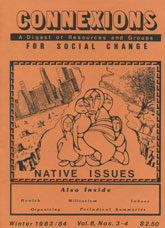
The Winter 1983-84 issue of Connexions had ‘Native Issues’ as its theme.
The introductory overview from the Connexions collective states that “Most of us are well aware of the critical and chronic problems facing Canada’s Native people. Land claims settlements are far from being resolved. Multinational resource corporations continue to explore and stake claims in the North, despite warnings of vast and irreparable ecological and social damage. Natives continue to be governed by the Indian Act – a piece of legislation dedicated to the subservience of (Native) rights under arbitrary authority.” The consequences of the Institutional racism and class structure of Canadian society continue to adversely affect Native people. This is reflected in rates of unemployment, numbers of suicides, incarceration and infant mortality that far exceed the national average. Yet most Canadian non-Natives are largely unaware of the diversity and intensity of the efforts of Native people to address these issues.”
Forty-one different projects and resources related to indigenous issues are included is this issue. In addition, the issue includes materials related to the economy, health, civil liberties, prisons, organizing, against, energy, environment, militarism, development education, lesbians and gays, labour, as well as periodical summaries and announcements. The Ways and Means section features an article on consensus decision-marking.
Here is a scanned copy.
Medical Reform Group
Medical Reform Group Newsletter - January 1984 - #
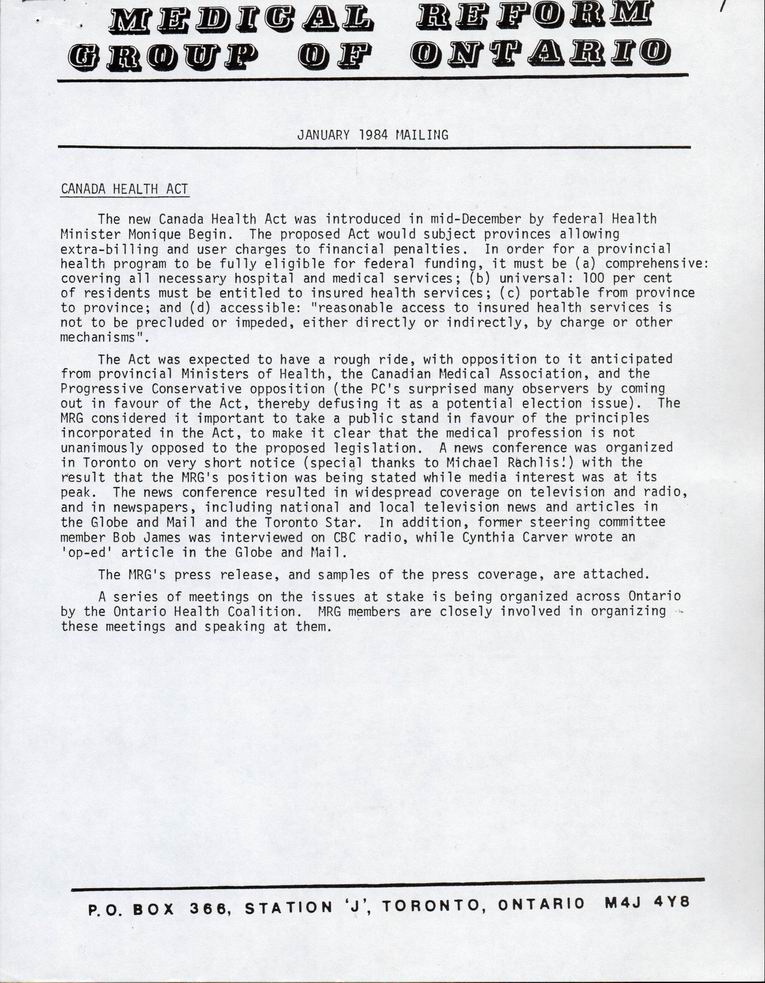
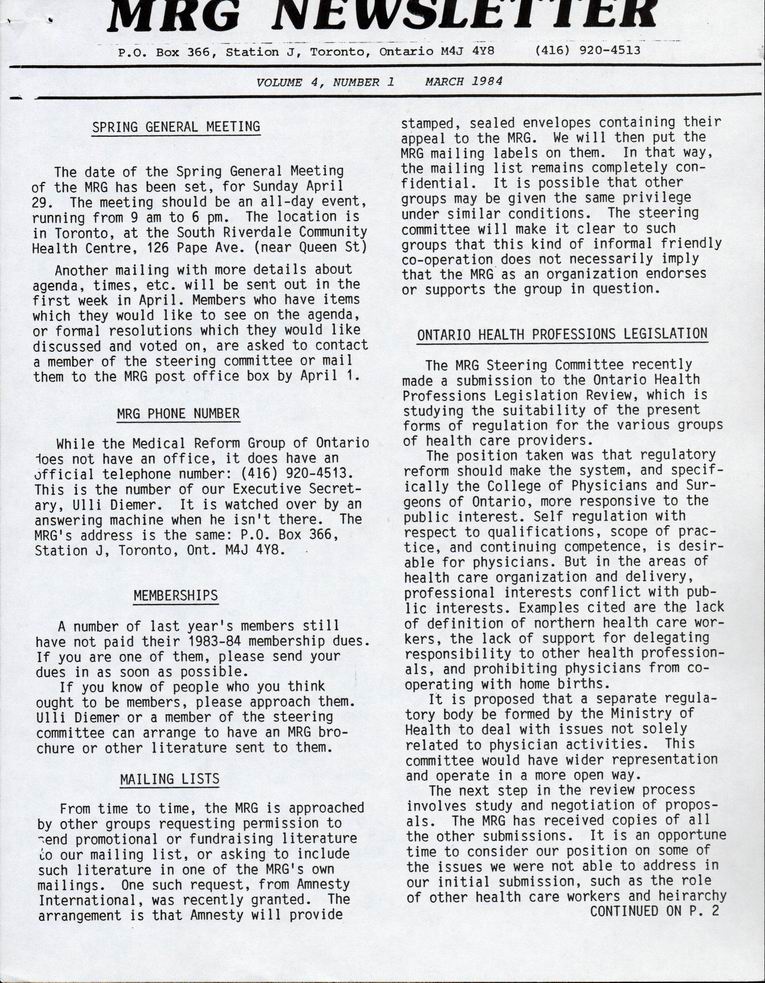
In December 1983 I started working part-time for the Medical Reform Group of Ontario (MRG). The MRG was a physicians’ organization concerned with reforming the health care system, and with countering the ideology of the mainstream medical profession, which tended to support user fees, extra billing, and a two-tier health care system.
The three founding principles of the Medical Reform Group stated:
1. The universal access of every person to high quality, appropriate health care must be guaranteed. The health care system must be administered in a manner which precludes any monetary or other deterrent to equal care.
2. Health care workers, including physicians, should seek out and recognize the social, economic, occupational, and environmental causes of disease, and be directly involved in their eradication.
3. The health care system should be structured in a manner in which the equally valuable contribution of all health workers is recognized. Both the public and health care workers should have a direct say in resource allocation and in determining the setting in which health care is provided.
My job was to take care of the administrative tasks of the organization and to put out the group’s newsletter, working with a small editorial group.
The first newsletter I did was a quick mailing, rather than a full newsletter, containing, among other content, the MRG’s news release responding to the federal government’s introduction of the Canada Health Act. The first real newsletter came out in March 1984.
View the January 1984 mailing here, and the March 1984 newsletter here.
An almost-complete list of Medical Reform Group newsletters from 1979 to 2014 can be found online in the Connexions Archive. Most but not all of the issues on the list are linked to a PDF of the newsletter.
The Connexions Digest - Volume 9, Number 1 - Energy
Spring 1984 - #

The theme of the Spring 1984 issue of Connexions is Energy and Environment.
The introduction to this issue begins by noting that Canada’s energy policy “has been decided on the basis of technical feasibility, efficiency and profit, and not on the basis of its social, political and environmental effects.... Corporations have told Canadians that the days of relatively cheap and abundant energy are over, and that a shortage of energy will bring economic disaster, to be averted only by the development of new and costly projects such as tar sands, Arctic oil and gas, huge hydroelectric dams, and nuclear power. Governments and public hydro utilities have supported these large-scale, capital intensive projects. The frightening results of this energy strategy have been analysed and documented by many of the groups listed in this edition of CONNEXIONS.”
It goes on to say that “There are alternatives to this ‘hard energy path.’ Contributors to this issue have researched and documented that an energy strategy based on conservation and renewable energy resources is both technically feasible and economically sound. It is possible to build small-scale projects, locally controlled, which cause minimal environmental and health problems, cost less, create more jobs, and respect aboriginal rights.”
Also included in this issue are sections of Militarism, Media, Education, Women, and Health, as well as Periodical Summaries and Announcements and Appeals.
Here is a scanned copy.
MRG Newsletter April 1984
Medical Reform Group Newsletter - April 1984 - #
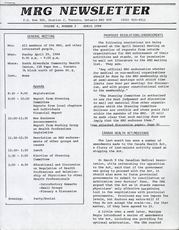
The April 1984 issue of the MRG Newsletter provided information about the upcoming Spring General Meeting of the Medical Reform Group, as well as the latest news regarding the proposed Canada Health Act.
The Canada Health Act, introduced by Monique Begin, the health minister in the federal Liberal government headed by Pierre Trudeau, aimed to put an end to extra-billing by doctors and to establish principles of health care provision that would apply in every part of Canada.
The Canada Health Act established five fundamental principles for medicare in Canada:
(1) Public Administration: All administration of provincial health insurance must be carried out by a public authority on a non-profit basis.
(2) Comprehensiveness: All necessary health services, including hospitals, physicians and surgical dentists, must be insured.
(3) Universality: All insured residents are entitled to the same level of health care.
(4) Portability: A resident who moves to a different province or territory is still entitled to coverage from their home province during a minimum waiting period.
(5) Accessibility: All insured persons have reasonable access to health care facilities.
The medical profession, insurance companies, Conservative governments, and right-wing lobby groups fought fiercely to prevent the Act from being passed. One typical full-page ad by the “National Citizens' Coalition,” a right-wing lobby group (reproduced in this issue of the newsletter), asked: “so... how would you like your open-heart surgery done by a civil servant? Or how would you like your baby delivered by the same folks who deliver the mail? Or your gall bladder done by a bureaucrat?” In Ontario, the Ontario Medical Association, the official organization of Ontario’s doctors, sent out a mailing to all its members asking them to support the NCC.
The Medical Reform Group of Ontario played an important role in countering the scare tactics of the mainstream medical profession. At an April 4, 1984 news conference, covered in this issue of the newsletter, the MRG condemned the “misleading and irresponsible campaign against the Act.” It stated that “In particular the elderly, those with chronic illness and those with acute symptoms have been intimidated by home delivery of pamphlets and newspaper advertisements suggesting that their access to care will be blocked by the Act – a frightening and false claim.” Statements by the MRG and its spokespersons received widespread coverage in the media.
The Canada Health Act officially became law on April 17, 1984.
See the April 1984 issue of the MRG newsletter here.
MRG Newsletter June 1984
Medical Reform Group Newsletter - June 1984 - #
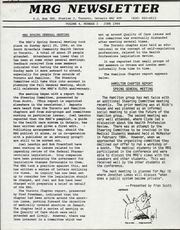
The June 1984 issue of the MRG Newsletter reported on discussions and decisions taken at the April General meeting.
The newsletter reported on two books written by MRG members: The Real Pushers: A Critique of the Canadian Drug Industry, by Joel Lexchin, and Patient Beware: Dealing with Doctors and Other Medical Dilemmas, by Cynthia Carver.
Another article in the issue reported a campaign by MRG member Dr. Philip Berger to stop the federal government’s proposed new security agency from having access to medical records.
In an article reprinted from the Medical Post, MRG spokespersons took issue with the “sad and shameful” scare campaign mounted by the Ontario Medical Association against the Canada Health Act.
Dr. Gorden Guyatt attacked claims that the quality of care would suffere when the Act is law and that many doctors will leave the country. The NCC implies that physicians who are opted out are superior physicians, he said, which is simply not the case and is an “insult to the 85 per cent of Ontario physicians who practise within the Ontario Health Insurance Program. Opted-out physicians do not represent the cream of the crop or the elite.“
See the June 1994 issue of the MRG newsletter here.
The Connexions Digest - Volume 9, Number 2 - Rights and Liberties
Summer 1984 - #
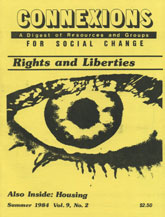
The Summer 1984 issue of Connexions is out with Right and Liberties as the theme.
The introduction notes: “In compiling CONNEXIONS, which focuses on a different social or political issue in each edition, we are often struck by how seemingly distinct problems turn out to be strongly intermeshed. Nowhere has this been more so than in this edition on ‘Rights and Liberties.’ Civil liberties and human rights appear as a key dimension in almost every other field of social justice and social change.
The struggle to change the role of women in society, for example, often revolves around equality and human rights. Environmental issues focus on our right to breathe clean air, drink clean water or lead lives in harmony rather than in conflict with nature. Economic issues pose the right to earn an income, to a fair share of society’s wealth, to security for the future. The question of peace concerns the right to live itself, free of fear of annihilation.
Western society is strongly coloured by the idea that we have rights which are ours ‘by right,’ not as a privilege bestowed by authority. Defining human rights gives rise to many of the sharpest political divisions of our time. This is especially true of the right to ‘freedom.’ What is freedom, for the individual and for the group? Freedom from what? Freedom to do what? Subject to what restrictions to safeguard the freedoms and rights of others?
If freedom is the ability to shape one’s life without domination by others, then what are its elements and pre-conditions?
How free are we, for example, if we are too poor to obtain decent housing, proper medical care, or education? How real is our right to ‘freedom of speech,’ if public discourse is dominated by a handful of large media chains, corporations and paid advertising and we have no realistic or effective way of making ourselves heard? How real is the right to equality nominally guaranteed by law in the face of immense inequities of wealth and power? In a society where our freedom is primarily defined as one of choice among alternatives in the marketplace, what happens to the possibility of choosing options that are never offered: for example, choosing to live in a real community rather than simply buying or renting housing?
Any discussion of rights involves recognition that human beings are both social and individual, and therefore that human rights include social and collective rights as well as individual rights.”
Here is a scanned copy.
Related: Rights and Liberties
MRG Newsletter September, 1984
Medical Reform Group Newsletter - September, 1984 - #
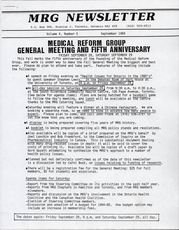
The September 1984 issue of the MRG Newsletter announced the agenda and activities planned for the Medical Reform Group’s General Meeting and Fifth Anniversary gathering.
Brief news items reported on the disastrous state of primary health care in El Salvador and the complicity of doctors in participating in torture in Uruguay.
Also included in the issue is a (second) submission of the Medical Reform Group to Ontario’s Health Professions Legislation Review. This submission addresses two issues: discipline by the College of Physicians and Surgeons of Ontario (CPSO), and the extension of self-regulation to other health professions.
An article from the Toronto Star, reprinted in this issue, profiles MRG member Cynthia Carver.
See the September, 1984 issue of the MRG newsletter here.
The Connexions Digest - Volume 9, Number 3 - Housing
Fall 1984 - #
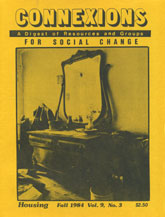
The Fall 1984 issue of Connexions had Housing and Homelessness as its theme.
This issue was compiled by Connexions in collaboration with the Urban Core Support Network (UCSN), a church-based, ecumenical association of individuals who are responding to the problems faced by people living at the margins of urban society.
There are two kinds of material abstracted or presented here. One group of abstracts points to efforts to analyze the problems and propose responses. Through commissioned studies, task group analyses or conferences and workshops, people across the country have been attempting to clarify the issues, identify the problems and propose solutions to the disappearance of housing for people in the urban core. The second group of abstracts includes descriptions of projects that are now in place or at the proposal stage. It is reflection on these projects that will provide the basis for more effective action in the future.
The papers and presentations abstracted here all document the seriousness of the situation and the inadequacy of current responses.
Here is a scanned copy.
MRG Newsletter November, 1984
Medical Reform Group Newsletter - November, 1984 - #
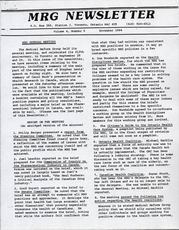
Reports on the Medical Reform Group’s Fall General Meeting were featured in this issue of the MRG Newsletter.
Items reported on and discussed at the general meeting included the MRG’s submission to the Commission of Inquiry on the Pharmaceutical Industry in Canada, which was largely based on Joel Lexchin’s newly published book, “The Real Pushers: A Critical Analysis of the Canadian Drug Industry.” A summary of the submission appears in this newsletter.
Gord Guyatt reported on the MRG’s brief to the Senate Committee reviewing Canadian health care policy. Michael Rachlis, the MRG delegate to the Ontario Health Coalition, reported on the Coalition’s lobbying efforts to ensure that the Canada Health Act is actually implemented.
Selected to be on the 1984-85 MRG Steering Committee were Philip Berger, John Frank, Fred Freedman, Gord Guyatt, Clyde Hertzman, Joel Lexchin, Michael Rachlis, Fran Scott, and Don Woodside. Also in this issue: Carol Buck’s “A Brief Briefing Paper to the Medical Reform Group on the Support of Health Research in Canada.”
See the November, 1984 issue of the MRG newsletter here.
MRG Newsletter January, 1985
Medical Reform Group Newsletter - January, 1985 - #
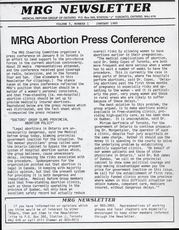
The Medical Reform Group’s efforts to support the pro-choice forces in the current abortion controversy are highlighted in this issue. The MRG Steering Committee held a press conference on the issue on January 8, 1985. About 20 media representatives attended, and the MRG’s intervention received good coverage on radio, television, and newspapers.
The MRG’s spokespersons said that legal abortions in Ontario as presently regulated are unnecessarily dangerous, with the current system of hospital quotas causing unnecessary delays and increasing the risks associated with the procedure.
“Delaying abortions past the first three months of pregnancy is especially risky and upsetting to the women – and it is particularly the poor, very young women, and those in rural areas who are likely to suffer because of the delays,” said MRG spokesperson Dr. Debby Copes.
It is unacceptable, said the MRG’s Dr. Miriam Garfinkle, for the government of Ontario to continue prosecuting Dr. Henry Morgentaler despite four jury acquittals on the same charge. Rather, it should use the money it is spending in court to solve the underlying problem by establishing publicly supported clinics, Dr. Garfinkle said.
See the January, 1985 issue of the MRG newsletter here.
MRG Newsletter March, 1985
Medical Reform Group Newsletter - March, 1985 - #
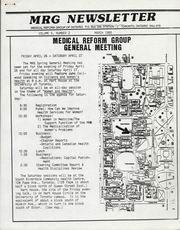
In this issue:
Medical Reform Group General Meeting
Women and Health Care
Meetings, Publications and Other Notes of Interest
The Doctor's Office that's Drive In
Good Communication is Essential
The Economic Illusion
Blood Testing an Ethical Trap
Ontario Group Wants Earlier, Easier Abortions
End Predicted to Medical Extra Billing
MRG: Enforcing Health Act Eliminating Premium Key
Health News Briefs
See the March, 1985 issue of the MRG newsletter here.
MRG Newsletter April, 1985
Medical Reform Group Newsletter - April, 1985 - #
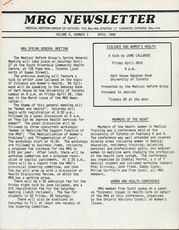
In this issue:
MRG Spring General Meeting
Report: Health Disciplines Review
Evolution of Health Care: A Working Option to OHIP, by Robert Frankford
Workers’ Centre Fights for Healthy, Safe Workplace
MD Broke Oath at U.S. Protest, Lawyer Charges
Brainwashing Protest
Asbestos Masks “Cosmetic” Says Firm
Vaccine Creator Walking Again
Abortion Pickets Miss the Point
Doctors Pressure Colleague
Pushing Pills for Profit in Canada, by Joel Lexchin
Health News Briefs compiled by Ulli Diemer
See the April, 1985 issue of the MRG newsletter here.
MRG Newsletter July, 1985
Medical Reform Group Newsletter - July, 1985 - #
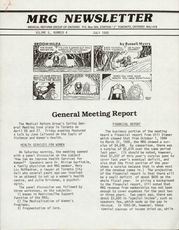
In this issue:
General Meeting Report by Ulli Diemer
From Steering Committee
Report: Health Disciplines Review
MRG Introduces “Generic” Speeches
Forum Discusses Nursing Report
Anne Coy on OARNA Review
The Doctors Who Care by June Callwood
Group Calls for End to Opting Out of OHIP
Extra-Billing Costs Ontario $44 Million
Premier Writes Doctors Supporting Extra Billing
Extra-Billing Avoided as a Big Election Issue
Abortion Foes Cite Historic Law
5 Doctors Get Abortion Training at Morgentaler’s Toronto Clinic
Doctors Looking South Face Familiar Problem
Health Care a Key Election Issue
Increase Price of Drugs to Pay for Research Inquiry Urges
Health News Briefs
Shaving Costs of Medical Care by Toning Up The System by Cynthia Carver
See the July, 1985 issue of the MRG newsletter here.
MRG Newsletter September, 1985
Medical Reform Group Newsletter - September, 1985 - #
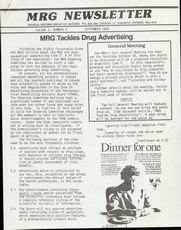
In this issue:
MRG Tackles Drug Advertising
MRG Meets With Health Minister by Gord Guyatt
Proposed Resolution on Maternal Health Care
First and Foremost in Community Centres: The Centre in Sault Ste Marie and the CHC Alternative Jonathan Lomas
A Letter to MRG Members From Nicaragua
Some MDs Expressing Alarm Over Drug Sales Campaigns by Linda McQuaig
Critique of Multinationalists Rejected by Journal’s Editor
Doctors’ Rights by Philip Berger
Case for Midwifery Gets Boost from Obstetrician
Challenge of Health Acts is Criticized
Health News Briefs
Letter to Michel Cote
See the September, 1985 issue of the MRG newsletter here.
MRG Newsletter October, 1985
Medical Reform Group Newsletter - October, 1985 - #
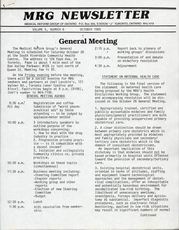
In this issue:
General Meeting
Former Judge Assails WCB
Company MDs Push Quick Return to Work, University Study Says
Stricken Workers Misused, Experts Say - Ian Mulgrew, Gabor Mate
The Company Doctor May Be a Hazard to Your Health
Why U.S. Medicare is Unfair to Millions of Elderly Citizens
See the October, 1985 issue of the MRG newsletter here.
MRG Newsletter December, 1985
Medical Reform Group Newsletter - December, 1985 - #
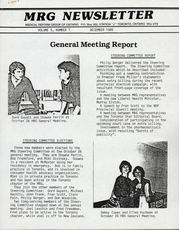
In this issue:
General Meeting Report
Higher Limits Proposed for Work-Place Toxins
OMA has Taken a Fringe Position on Extra Billing, Says Reform Group
Doctors Denounce as Unfair Proposed Extra-Billing Ban - Ann Silversides
Dr. Michael Rachlis Addresses Poverty Meeting
Labour Group Fights Medical Monitoring
Health News Briefs
Resolutions at Fall General Meeting
See the December, 1985 issue of the MRG newsletter here.
MRG Newsletter February, 1986
Medical Reform Group Newsletter - February, 1986 - #
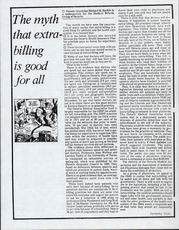
In this issue:
Media Coordinator’s Report - Michael Rachlis
Press Releases
The Myth That Extra-Billing is Good for All - Michael Rachlis
MRG Continues Battle Against Extra Billing - Michael Rachlis
End of Extra-Billing: What do MDs Merit? - Judy Steed
Extra-Billing: MD Claims Won’t Wash - Gordon Guyatt
OHIP Feud Centres on Freedom, Fairness
Privatization of Health Care Seen as No Solution to Problem of Cost - Ann Silversides
Reformer Rips OMA 'Blunder' - Linda Barnard
Medical News Briefs
See the February, 1986 issue of the MRG newsletter here.
MRG Newsletter April, 1986
Medical Reform Group Newsletter - April, 1986 - #
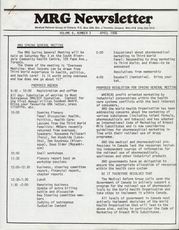
This appeared at the height of the battle over extra-billing in Ontario.
In this issue:
MRG Spring General Meeting
Update on Extra Billing - Michael Rachlis
MRG Press Statements
MRG Summary Sheet for CMA Task Force Report on the Allocation of Health Care Resources
Progress On Rational Use of Drugs
Coalition Warns Mulroney to Resist Drug Industry Pressure
Letter to College of Family Physicians
Against... Dr. Barbara Lent - Dahlia Reich
Reform Group Accuses Doctors of Burying Negative Report - Linda McQuaig
Doctors’ Group Supports Ban
Extra-Billing Stands Draws MDs’ Ire - Ann Silversides
Extra-Billing Worry for Senators
Doctors in Ontario Show Rare Unity in Extra-Billing Battle
Many Area MDs Back Call for Defiance
OMA asked for Apology Over ‘False’ Poster on Extra Billing
Labor, Women, Elderly to Rally in Support of Extra-Billing Ban
OMA Plans Health Care Accessibility Week and Asks Members to Disobey Pending Law
Doctors’ Groups Split Over Extra-Billing Law as MPPs Start Hearings
Doctors’ View of Civil Servants Insulting, Union President Says
Lincoln MDs Will Stage First Protest
Ban Doctors’ Extra Billing - Gordon Guyatt
Patients Print Own Cards on Billing - Ann Silversides
Practising What We Preach: A Profile of Nikki Colodny
Abortion Doctor Breaks Silence in Call for Coverage by OHIP
OMA Fanatics Ruining Respect Doctors Earned - Trevor Hancock
See the April, 1986 issue of the MRG newsletter here.
The Connexions Digest - Volume 10, Number 1 - The Arts and Social Change
Spring 1986 - #
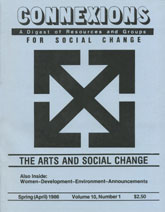
The Spring 1986 issue of Connexions is out: with The Arts and Social Change as the theme.
The Spring 1987 issue of Connexions is on the theme of The Arts and Social Change.
Most of this issue focuses on artists and creative groups who bring awareness to social issues and advocate for social change through their work.
The introduction notes that “There has been a re-awakening of the arts in Canada in recent years. Theatre groups have sprung up in small communities and in large cities. New art and photographic galleries display the previously neglected works of women, native people, prisoners and working people. Video has given us a new window on the world. Many groups are making use of the arts to stimulate people's imaginations so they can be aware of the world and see what needs to be changed.
Art in North America has generally been enlisted on the side of the personal and individualistic. Our society has made a cult of outcast artists and thus has effectively marginalized them. But now, groups of artists, outraged by the injustices of our society, are creating new bridges of trust between themselves and the communities where they live.
This issue of CONNEXIONS will introduce you to some of these groups who are attempting to expand our visions of the world.”
The issue also includes materials on Women, International Development, Community, Education, Latin America, Environment, Handicapped/Differently Abled, Gay Liberation, Human Rights and Civil Liberties, as well as Announcements and Appeals.
Here is a scanned copy.
MRG Newsletter June - July 1986
Medical Reform Group Newsletter - June - July 1986 - #

In this issue:
General Meeting Report
But this Doctor Talking Medicine, Not Politics
Doctor Defends Government on Extra Billing Issue
MRG in the Media - Gord Guyatt
Group’s Claims on Health Care are Disputed
Treating the Person, Not the Purse?
Lesson for Ontario Doctors in Two Western Facedowns - Gabor Mate
The Sick Will Be the Ones Who Suffer - Anita Elash
MD Remains at Work; Cites More Serious Challenge - Ann Silversides
Health News Briefs
Mock Trial Finds Abortion Laws Unjust
Doctors Resist Needed Reform
Drug Industry Warns New Bill Could Cost Ontario 2,000 Jobs
Choice’s New Face - Susan G. Cole
This Doctor Supports Ban and Refuses to Stop Working
Doctor Criticizes OMA for Extra-Billing Stand - Ann Silversides
Reformer Question OMA Tactics
Doctor Opposed to Strike Says it 'Victimized' One Patient
MRG Resolution Approved at Semi-Annual Meeting May 3rd 1986
Summary of the brief presented by the MRG to the Legislature Standing Committee on Social Development on Bill 94
Extra Billing - Gordon Guyatt
See the June - July 1986 issue of the MRG newsletter here.
MRG Newsletter October, 1986
Medical Reform Group Newsletter - October, 1986 - #
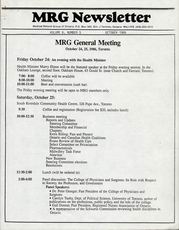
In this issue:
MRG General Meeting
News Briefs
Update on Proposed Changes to the Patent Act - Joel Lexchin
Extra Billing: What's Up, Doc? - Susan Stock
Labour Ministry Officials Sabotaging Laws to Protect Workers, Brief Says
Laying the Blame for a Political Catastrophe - Philip Berger
See the October, 1986 issue of the MRG newsletter here.
MRG Newsletter December, 1986
Medical Reform Group Newsletter - December, 1986 - #
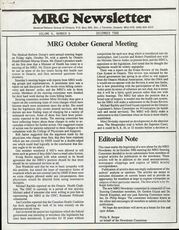
In this issue:
Report on MRG October General Meeting
After the Doctors' Strike: Where Do We Go from Here? - Ralph W. Sutherland
Get Consent for AIDS Test, Doctor Urges
Medical Mistakes Slip Through Testing Net, Authors Say
Job Threatened Over Studies of Cancer Links, MD Says
Doctor Defends Toned-Down Study on Worker Health
Power Shifts to Insurers in U.S. Medical System
Technology Serves the Rich While the Poor Wait for Care - Ann Silversides
Community Clinics Called Sane Route to Health Services - Ann Silversides
U.S. Leads the Way in Controlling Health Care Costs - Ann Silversides
New Fees Allowed MDs Slammed by Medical Group
Women Get Worse Medical Care than Men, Female Doctor Says
Health News Briefs
Submission to the Committee on Privatization from the Medical Reform Group of Ontario
See the December, 1986 issue of the MRG newsletter here.
MRG Newsletter February, 1987
Medical Reform Group Newsletter - February, 1987 - #

In this issue:
MRG Responds to Request from Evan Commission
Doctors and Strikes and Governments - Haresh Kirpalani
Discussion Paper of Issues Related to the Physicians' Job Against Bill 94 - Michael Rachlis
Health News Briefs
A Prescription for Profits - Joel Lexchin
Abortions at Morgentaler Clinic Doubled Because MDs Refuse Referrals
Workers' Health and Safety Checkup - Ellie Kirzner
Extra-Billed Patients Given $7,000 - Ann Silversides
See the February, 1987 issue of the MRG newsletter here.
MRG Newsletter April, 1987
Medical Reform Group Newsletter - April, 1987 - #
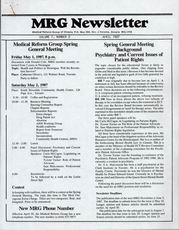
In this issue:
Medical Group Spring General Meeting Background Psychiatry and Current Issue of Patient Rights
1986 Amendments to the Ontario Mental Health Act
Learning Political Science With the MRG - Robert Frankford
Alternative Therapies - A Challenge - Fred Freedman
The British Columbia Billing Numbers Dispute - Haresh Kirpalani
Challenges to Hospitals Under Charter are Predicted - Ann Silversides
The MRG Brief to the Parliamentary Committee on Bill C-22
Health News Briefs - Ulli Diemer
A Nasty Replica of Question Period - Joel Ruimy
Politicians Moving Cautiously on Abortion - Rosemary Speirs
Mental Health Act Amendments: Review for the Spring 1987 Meeting of the MRG - Don Woodside
See the April, 1987 issue of the MRG newsletter here.
The Connexions Digest - Volume 11, Number 1
Spring 1987 - #
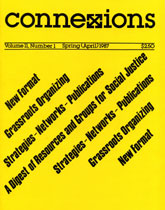
This issue introduced some changes in the format and design of the Connexions Digest. It is the first issue to be printed on newsprint. The Ways and Means section is expanded and moved to the front. Featured articles are The March (on a peace march); Making their Voices Heard (on Central America-focused organizing in Prince Edward Island); Citizens Group Scores Success in Anti-Lead Battle; Our Little Victory (on anti-militarist organizing in Prince Edward Island); Power in Play: Reclaiming Play in the Serious Work of Our Lives; Meeting the Media (a reprint from Media for Social Change0). A new section of the Connexions Digest is Network News, with news and information from groups across Canada.
Also new is Activist’s Bookshelf, a section presenting information about reference materials and resources dealing with the ‘nuts-and-bolts’ aspects of organizing and maintaining grassroots organizations and activities.
The New Resources section features resources on Development and International issues; Economy, Poverty, and Work; Education and Children; Environment, Land Use, and Rural issues; Health, Human Rights and Civil Liberties; Peace, Women, and general social justice resources.
Here is a scanned copy.
MRG Newsletter June, 1987
Medical Reform Group Newsletter - June, 1987 - #
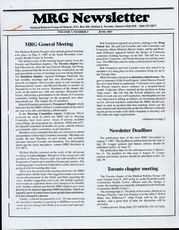
In this issue:
MRG General Meeting
Book Review (A Savage Enquiry: Who Controls Childbirth?) - Catherine Oliver
Women’s Health Initiatives: Steps Forward or Sideways? - Fran Scott
Health News Briefs
Hospitals’ Bold Assault on City Treasury
Prognosis for Walk-In Clinics: Good Health Throughout ’80s
Prepaid Plans: Will Dentists Bite? - Marina Strauss
Doctors’ Blood Pressure Climbs When Income Drops; Study Finds
Health Care Field Provides No Cure for Gambling Urge
Keeping the Lid on the Health-Care Pressure Cooker
See the June, 1987 issue of the MRG newsletter here.
MRG Newsletter August 1987
Medical Reform Group Newsletter - August 1987 - #

In this issue:
Steering Committee Update
MRG Second Annual Picnic
Toronto chapter meeting
Health News Briefs
Free Trade and Health Care in Canada - Haresh Kirpalani
Health & Safety Committees need more teeth
Patient rights ‘lost in shuffle’ in health-care power struggle
Hospitals pitch harder for patients
Editors Lamenting Doggrell
See the August 1987 issue of the MRG newsletter here.
MRG Newsletter October 1987
Medical Reform Group Newsletter - October 1987 - #
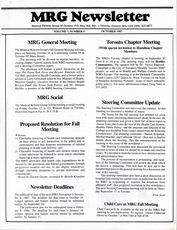
In this issue:
Proposed Resolution for Fall Meeting
Steering Committee Update - Fran Scott
MRG Incorporation
AIDS Working Group Update
Toward a Shared Direction for Health in Ontario: Report of the Ontario Health Review Panel June 1987
Doctors use administration fees to get around billing rules
Doctors' group wants all party leaders to outline plans for ending extra-billing
Health issues the candidates are ignoring - Trevor Hancock
Questions to Political Parties
Ontario Liberal Party Response to MRG Questionnaire
NDP Response to MRG Questionnaire
Progressive Conservative Party Response to MRG Questionnaire
Close links between doctors, drug industry
See the October 1987 issue of the MRG newsletter here.
MRG Newsletter October - November, 1987
Medical Reform Group Newsletter - October - November, 1987 - #
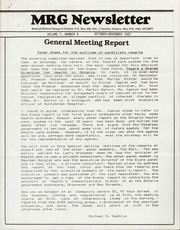
In this issue:
General Meeting Report Michael Rachlis
A Premier’s Council on Health: Is it a Benefit to Reform or Will It Be an Impediment to Change? - Ted Ball
See the October - November, 1987 issue of the MRG newsletter here.
MRG Newsletter December, 1987
Medical Reform Group Newsletter - December, 1987 - #
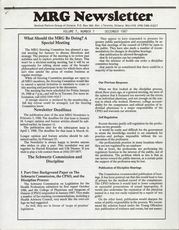
In this issue:
The Schwartz Commission and Discipline
Doctors Using Administration Fees to Get Around Billing Rules: Report
Why Women’s Groups Oppose Depo-Provera - Marsha M. Cohen
A Review of “To Hurt and To Heal” - Philip Hebert
Another Review of “To Hurt and To Heal” - Haresh Kirpalani
AIDS and the Restriction of Liberties - Philip Hebert
News Briefs
Skid Row Revisited
Social Spending Can Avert a Recession
Utilization of Health Care in Ontario Partially Falls in Laps of Doctors
Hospitals Find Sidelines to Raise Money for Care - Marina Strauss
Hospital in the Home
Ministers Differ on Linking of Trade, Drugs
Report Predicts Imports Will Flood Market
Good Health Care: Is It a Legal Right?
Business Smells Profit in Bid for Clean Workplace
Seizing the Unborn
Health Care System Cheaper than in U.S.
Rising Costs of Health Care Still Outstrip Medicare Gains
73 of 100 Sewage Staff Have Skin Complains, Study Says
Workers Get Right to Pick Own MD for Health Testing
No Tests CMA Says
Doctors’ Group Wants All Party Leaders to Outline Plans for Ending Extra-Billing
Media Omit AIDS Facts - Glenn Wheeler
Don’t Punish the Sick with Deterrent Fees - Haresh Kirpalani
See the December, 1987 issue of the MRG newsletter here.
The Connexions Digest - Volume 11, Number 2
Winter 1988 - #

The Winter 1988 issue of Connexions.
The Ways and Means section of this issue featured articles on Managing Volunteers, Building Consensus, Nurturing Creativity; Conflict Resolution in the Classroom: A Curriculum Project; Pressing for Press; Overcoming Male Oppression.
The New Resources section features resources on Development and International issues; Economy, Poverty, and Work; Education and Children; Environment, Land Use, and Rural issues; Health, Human Rights and Civil Liberties; Native Peoples; Peace, Women, and general social justice resources.
Also in this issue: the Activist's Bookshelf, Network News, Comings and Goings, Letters, and a page of classified ads.
Here is a scanned copy.
MRG Newsletter February, 1988
Medical Reform Group Newsletter - February, 1988 - #
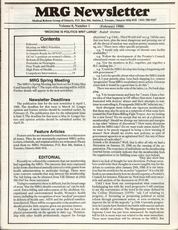
In this issue:
Editorial - Haresh Kirpalani
Meeting on MRG Directions - Ulli Diemer
Is Ontario Now Ready for H?O's? - Robert Frankford
OCAC Response to the Proposed Women’s Health Centres - Catherine Oliver
Health Promotion & Pesticides the Nicaraguan Strategy - Donald Cole and Merri Weiger
Free Trade - Its Effect Upon Women, the Health Care System and the Arms Industry
High Price of Health
Compulsory Obstetric Interventions
See the February, 1988 issue of the MRG newsletter here.
MRG Newsletter April, 1988
Medical Reform Group Newsletter - April, 1988 - #
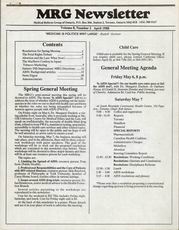
In this issue:
Resolutions for Spring General Meeting
The Fetal Rights Debate - Bob Kellermann
Abortion and the Law: What Now? - Nikki Colodny
Marlboro Cowboy Rides Again in the East - Jack Micay
Impressions of January 29th
AIDS and Medical Confidentiality
Refusal to Treat AIDS and HIV Positive Patients
Drugs and AIDS
The Price of Treating AIDS - Joel Lexchin
Insurance Firms Breaking Law
Will Ontario Meet Obligations in AIDS Fight? - Philip Berger
Doctor Calls Education Programs Inadequate
Doctors Opposing the Use of Placebo in Test of AIDS Drug
Doctors Continue to Extra-Bill
News Digest
“Asylum”: A Film Review - Bob James
See the April, 1988 issue of the MRG newsletter here.
MRG Newsletter June, 1988
Medical Reform Group Newsletter - June, 1988 - #
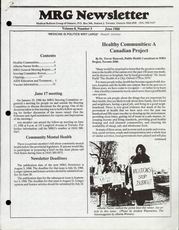
In this issue:
Healthy Communities: Canadian Project - Trevor Hancock
The Alberta Nurses Strike
MRG Spring General Meeting Summary - Ulli Diemer
Steering Committee Report
Letter on AIDS Education and Care - Philip Berger
Information Sheets for Immunization - Robert James
Lawyers for Tobacco Firms Reconnoiter at Trial
Tobacco Companies Mount Major Legal Effort in Trial
Setting a Fairer Price for Medicare
Controversial Program Would Withold Treatment from Half of the 300 Patients
Good Medicine, Better Business
Industry Helped at Expense of Research, Student Group Says
Scholar Stresses Home AIDS Care - Ann Silversides
Accord Viewed as Near on Medicare Bill
See the June, 1988 issue of the MRG newsletter here.
MRG Newsletter September, 1988
Medical Reform Group Newsletter - September, 1988 - #
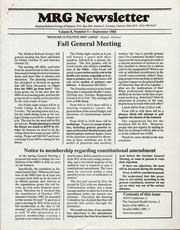
In this issue:
Fall General Meeting
Report on the IV International Conference on AIDS - Philip Berger
The National Health Service: Part I
The Medical Reform Group of Ontario, A Study of a Political Interest Group - Don Woodside
“Healthy MRG 1989” - Don Woodside
See the September, 1988 issue of the MRG newsletter here.
The Connexions Digest - Volume 12, Number 1
Fall 1988 - #

The Fall 1988 issue of Connexions.
Featured articles in the Ways and Means section of this issue are: A Fundraising Success; The Extraordinary Myles Horton; Raging Grannies; Setting Up a Nuclear Weapon Free Zone; Little Brother Watches Back; It Ain’t the Meeting, It’s the Motion!; One Vote for Democracy.
The New Resources section features resources on Community, Urban, and Housing; Development and International issues; Economy, Poverty, and Work; Education and Children; Environment, Land Use, and Rural issues; Human Rights and Civil Liberties; Native Peoples; Peace, and Women.
Also in this issue: the Activist’s Bookshelf, Network News, and classified ads.
Here is a scanned copy.
MRG Newsletter October, 1988
Medical Reform Group Newsletter - October, 1988 - #
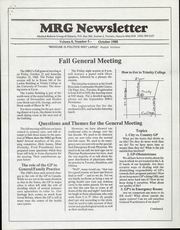
In this issue:
Questions and Themes for the General Meeting- Fred Freedman
Steering Committee Report Fall 1988 - Don Woodside
Health Focus Group on CHOs - Bob Frankford
Drug Use in Zimbabwe and Lesotho - Norman Nyazema
Announcements
See the October, 1988 issue of the MRG newsletter here.
Medical Reform newsletter December, 1988
Medical Reform Group Newsletter - December, 1988 - #
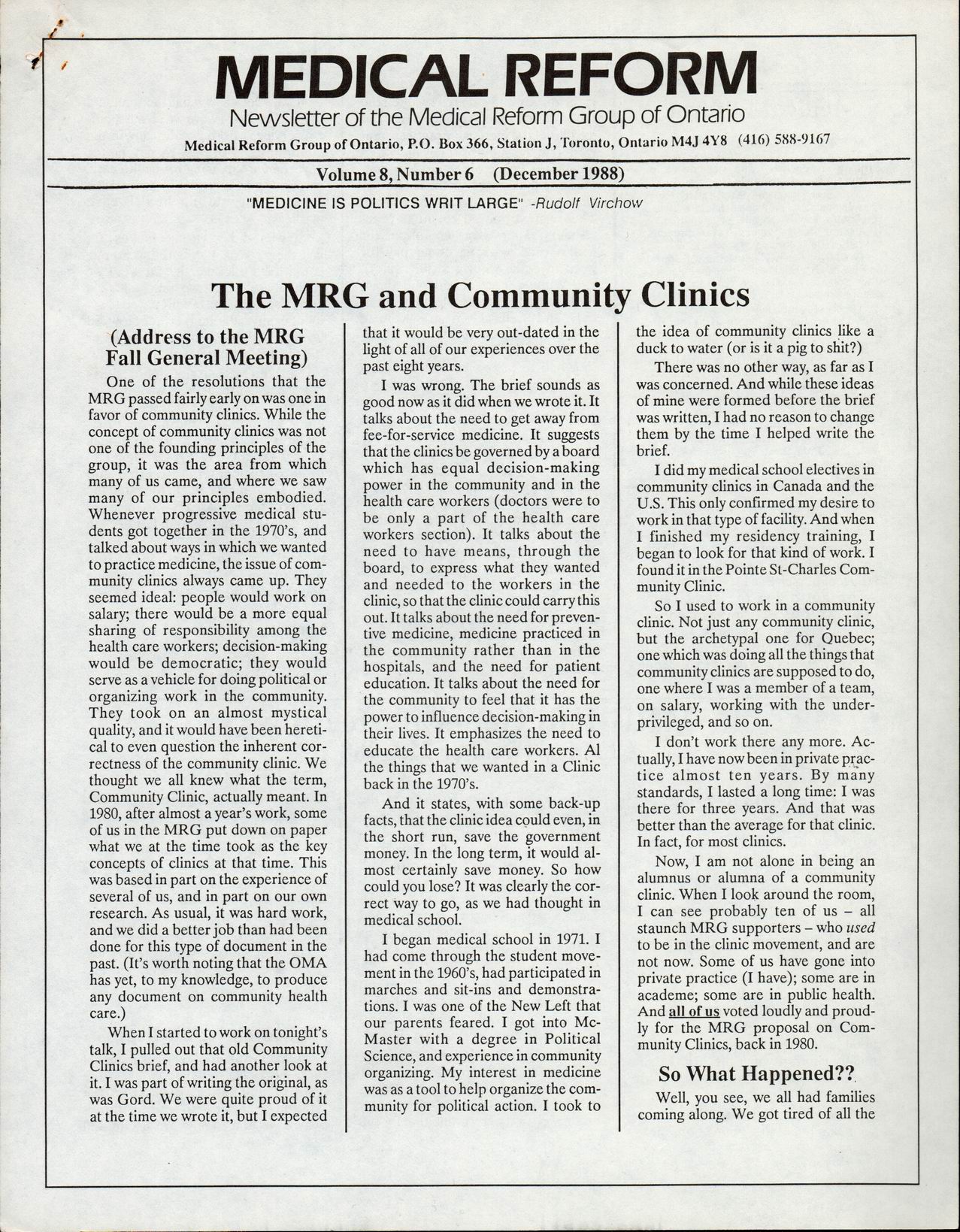
In this issue:
The MRG and Community Clinics - Bob James
MRG Fall General Meeting report - Ulli Diemer
MRG Statement on Free Trade
Health Professions on Legislation Review Update
The Children of the Siege - Haresh Kirpalani
Prescribing In Canada: A Review of the Literature - Joel Lexchin
The Psychiatric Care of Detainees
Could Free-Trade Deal Lead to Bottom-Line Medicine? - Jack Micay
Legalize Midwifery, Group Urge
Epp is Criticized for Veto of Research Using Fetuses
Soaring Health Costs are About to Torpedo U.S. Corporate Profits
Drug Patent Under Opposition Fire
Clinics Providing 'Front-Line Medicine' - Ann Silversides
See the December, 1988 issue of Medical Reform here.
The Connexions Digest - Volume 12, Number 2
Winter 1988-89 - #

A much larger than usual number of copies of The Winter 1988-89 issue of Connexions were printed; many of them were sent out as complimentary promotional copies.
Featured articles in the Ways and Means section were: What Do We Do Now? Building a Social Movement in the Aftermath of Free Trade; Amnesty: The Inside Story; A Targeted Approach to Worker Co-op Development: Lessons from Mondragon and Northern Italy; How You Can Help Make a Difference; Voluntary Simplicity.
The New Resources section featured materials on Arts, Media and Culture; Community, Urban, and Housing; Development and International issues; Economy, Poverty, and Work; Education and Children; Environment, Land Use, and Rural issues; Health; Human Rights and Civil Liberties; Native Peoples; Peace, and Women.
Also in this issue: Activist’s Bookshelf, Network News, and classified ads.
Here is a scanned copy.
Medical Reform newsletter April 1989
Medical Reform Group Newsletter - April 1989 - #
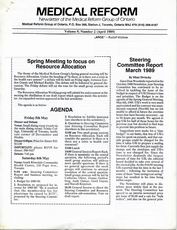
In this issue:
Spring Meeting to focus on Resource Allocation
Steering Committee Report March 1989
Proposed Resolution: Resource Allocation in Health and health Care
Community Health Clinics: A Reply to Bob James - Frances Kilbertus
Review: “Controlling Health Expenditures: The Canadian Reality” - Haresh Kirpalani
News and Views With a Personal Slant - Haresh Kirpalani
MRG Meets with Health Minister Caplan and Deputy Minister Barkin - Joel Lexchin
Comments on Malpractice - Haresh Kirpalani
Malpractice Insurance: Is There a Better Way? - Joel Lexchin
News Briefs
Is anyone reading the fine print? - Joel Lexchin
See the April 1989 issue of Medical Reform here.
Medical Reform newsletter June, 1989
Medical Reform Group Newsletter - June, 1989 - #
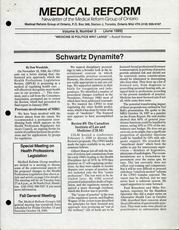
In this issue:
Schwartz Dynamite? - Don Woodside
Comments on the Schwartz Commission - Bob James
Resource Allocation in the Health System - Michael Rachlis
Re-Allocating Resources for Health
A National Health Program for U.S.? - Robert Frankford
Book Review: “Second Opinion” - Fred Freedman
Book Review: Worse than the Disease - Robert Frankford
Radical Deficit Cutting - Haresh Kirpalani
News Briefs - Ulli Diemer
See the June, 1989 issue of Medical Reform here.
Medical Reform newsletter August 1989
Medical Reform Group Newsletter - August 1989 - #
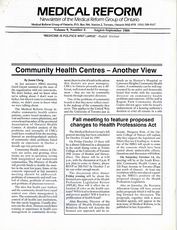
In this issue:
Community Health Centres - Another View - Jamie Uhrig
Fall meeting to feature proposed changes to Health Professions Act
Health Care Cutbacks at McMaster University - Gord Guyatt
Issues in Home Care - Bob James
Letter to Elinor Caplan on Home Care - Robert James for Medical Reform Group
Psychiatric Drugs: letter from Phoenix Rising - Don Weitz
Ontario plan transfers adults from institutions to group homes
What's Sauce for the Goose is not Sauce for the Gander - Two Recent News Items!!
See the August 1989 issue of Medical Reform here.
The Connexions Annual - A Social Change Sourcebook - 1989
September 1989 #

Billed as “A Social Change Sourcebook” with “Information and ideas about social and environmental issues”, The Connexions Annual is a special 224-page directory issue of the Connexions Digest, edited by Ulli Diemer, provides information about more than 2,700 groups and periodicals.
The book is divided into a number of main sections: Arts/Media/Culture; Community/Urban/Housing; Development/International; Economy/Poverty/Work; Education/Children; Environment/Land Use/Rural; Health; Human Rights/Civil Liberties; Lesbians/Gays; Native Peoples; Peace; Women; Social Justice: General; Other Useful Organizations; Canadian Alternative Periodicals; Foreign Alternative Periodicals; Useful Sources of Information; as well as a Name Index, Geographical Index, and Subject Index.
The introduction explains, “The Connexions Annual is for people who are looking for information and ideas about social and environmental alternatives.
“The Annual is dedicated to the idea that change is both necessary and possible. It is a gateway into vigorous grassroots movements of ordinary people who believe that there are viable alternatives to destructive and exploitative institutions and structures – and who are actively working to bring those alternatives into being.
“The Annual is designed both for those already actively involved in working for change, and for those who want to become involved.”
Here is a scanned copy.
Read the introduction to the 1989 Annual here.
Medical Reform newsletter October 1989
Medical Reform Group Newsletter - October 1989 - #
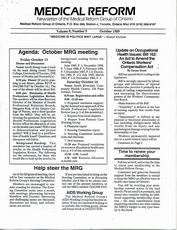
In this issue:
Agenda: October MRG meeting
Update of Occupational health Issues - Susan Stock
Proposed Resolution: Funding for Effective but Expensive Interventions - Resource Allocation Working Group
Proposed Resolution: Closing and building new hospital beds - Resource Allocation Working Group
Proposed Resolution: Capping Health Care Expenditures - Resource Allocation Working Group
Proposed Resolution: A Democratic Forum for Decision-Making - Resource Allocation Working Group
Book review: Jim: a life with AIDS - Susan Inwood
Book review: Health Care in Canada - Haresh Kirpalani
Corporate-funded research may be hazardous to your health - Kathleen Hart
Funds end threatends information centre on health and safety
Health Care for All - With Limits - Brian Johnston
News Briefs
See the October 1989 issue of Medical Reform here.
The Connexions Digest - Number 50
December 1989 - #
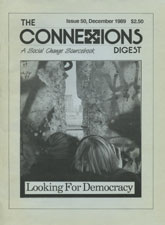
The December 1989 issue of the Connexions Digest appeared shortly after the Berlin Wall opened. The lead article by Ulli Diemer, Looking for Democracy, reflects on the need for radical democratization, not only in eastern Europe, but in the West.
Other articles in this issue are The Need for Alternative Employment, by Gary Moffatt; Grassroots Cells, Devil’s Architects Defend Communities (a review of The Householder’s Guide to Community Defence Against Bureaucratic Aggression; and The Write Stuff: All You Ever wanted to Know about Letter Writing, from the Temagami Wilderness Society.
The New Resources section featured materials on Development and International issues; Economy, Poverty, and Work; Education and Children; Environment, Nature, and Rural issues; Health; Human Rights and Civil Liberties; Lesbians/Gays; Peace, and Women.
Also in this issue: Alternative Voices, Activist’s Bookshelf, Network News, Letters, and classified ads.
Here is a scanned copy.
Medical Reform newsletter December 1989
Medical Reform Group Newsletter - December 1989 - #
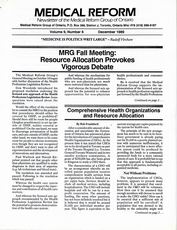
In this issue:
MRG Fall Meeting: Resource Allocation Provokes Vigorous Debate - Ulli Diemer
Comprehensive Health Organizations and Resources Allocation - Bob Frankford
The New Health Professions Legislation scrutinized
Practical Ways to Provide Health Care to Homeless People - Dilin Baker
What the MRG Said About the Independent Health Facilities Act: Submission to Legislature Committee on Bill 147
The American disaster - Gord Guyatt
Canada does well at controlling health costs Gord Guyatt
Not bad - for a start - Joel Lexchin
The Doctor’s Part in Community Health - Robert Frankford
News Briefs
Let’s plug the gaps in Ottawa's drug safety laws - Joel Lexchin
See the December 1989 issue of Medical Reform here.
Medical Reform newsletter April, 1990
Medical Reform Group Newsletter - April, 1990 - #
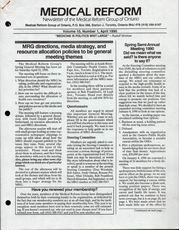
In this issue:
MRG Directions, Media Strategy, and Resource Allocation Policies to be General Meeting Themes
The MRG Dilemma - Ralph W. Sutherland
A Glut of Doctors - Don Woodside
What Kind of Primary Care Model? - Bob James
What’s Wrong With Primary Care (and What Can We Do About it?) - Brian Hutchison
Inside HMOs - From the USA - Steffie Woolhandler
MRG Submission on ‘Fetal Rights’ - Mimi Divinsky
Review: Inside Ciba-Geigy - Olle Hansson
My Summer Vacation - Clayton Ruby
B.C. Heart Patients Await News on Bid to Clear Surgery Backlog
The Spectre of Two-Tier Medicare
Ontario MDs Alarmed by Panel’s Proposal for Cap on Medicare - Christie McLaren
Study Question Need for Clinics
Group Urges Review of Costly Medical Technologies - Christie McLaren
Health Plans Found to Cut Hospital Costs
MDs Consider Limiting Tests for Dementia
News Briefs
Shortage of Nurses in Parts of Canada Stirs New Look at Pay - Christie McLaren
See the April, 1990 issue of Medical Reform here.
The Connexions Digest - Number 51
May 1990 - #

The May 1990 issue of Connexions features Alternative Voices, Network News, News Briefs, the Activist’s Bookshelf, and classified ads.
The New Resources section features materials on Arts/Media/Culture; Community/Urban/Housing; Development and International issues; Economy, Poverty, and Work; Education and Children; Environment, Nature, and Rural issues; Health; Human Rights and Civil Liberties; Native Peoples; Peace, and Women.
Here is a scanned copy.
Medical Reform newsletter July, 1990
Medical Reform Group Newsletter - July, 1990 - #
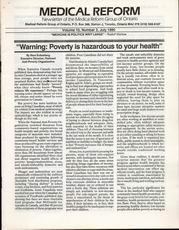
In this issue:
“Warning: Poverty is Hazardous to your Health” - Havi Echenberg
Poverty - What’s Being Done About It? - Janet Mosher
SARC Update - Cathy Crowe
Facts and Fallacies - Resource Allocation - H. Kirpalani and A. Oxman
The MRG Health Policy Menu - Ralph W. Sutherland
How You Responded to the Questionnaire
Medical Reform Group of Ontario General Meeting Minutes - Ulli Diemer
See the July, 1990 issue of Medical Reform here.
The Connexions Digest - Number 52
August 1990 - #

The August 1990 issue of Connexions has articles on: Transforming Apathy and Denial; A Nuclear-Free Canada; What’s Left?; Helsinki Citizens Assembly; The GST and the Big Tax Picture (a special 8-page section on the regressive Goods and Services Tax being pushed forward by Canada's Conservative government).
The New Resources section features materials on Arts/Media/Culture; Development and International issues; Economy, Poverty, and Work; Education and Children; Environment, Nature, and Rural issues; Health; Human Rights and Civil Liberties; Lesbians/Gays; Peace, Women, and Social Justice: General. Also in this issue: Network News, News Briefs, and Classifieds.
Here is a scanned copy.
Medical Reform newsletter September, 1990
Medical Reform Group Newsletter - September, 1990 - #
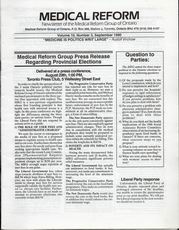
In this issue:
Medical Reform Group Press Release Regarding Provincial Elections
Questionnaire Responses from Progressive Conservative and New Democratic Parties
Primary Care
Steering Committee Report August 1900 - Andy Oxman
MRGers Meet With Ontario Medical Association Representatives
Speaking Up for the OMA - Bob Frankford
The OMA and the MRG - Fred Freedman
MRG’s Relationship to OMA - Barbara Lent
Letter on Administrative Fees
What the American Medical Press is Saying: Recent News from the NEJM - Gord Guyatt
Cross-Cultural Caring: A Handbook for Health Professionals in Western Canada - Sue Inwood
Letter on Community Care - Eugene Vayda
The Medical Reform Group of Ontario Searches for Purpose
Letter to CMA Journal: Our Principles are Still a Beacon
Life After Extrabilling: A Brief Comment - Haresh Kirpalani
See the September, 1990 issue of Medical Reform here.
Medical Reform newsletter October, 1990
Medical Reform Group Newsletter - October, 1990 - #
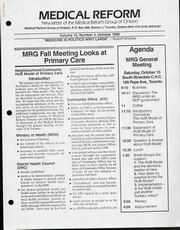
In this issue:
MRG Fall Meeting Looks at Primary Care
The Medical Reform Group under an NDP government
See the October, 1990 issue of Medical Reform here.
The Connexions Digest - Number 53
January 1991 - #

The January 1991 issue of Connexions is out.
This issue was published just as the United States and its allies launched their attack on Iraq. An article by Ulli Diemer, “War in the Gulf,” condemns the war. Also in this issue: an article on the Rafferty-Alameda dams in Saskatchewan; “The collective decides”: critiquing how collective decision-making is practised in many organizations; and Communicating Effectively Through Your Newsletter.
Short items in the Alternative Voices section include Working together for peace; Quebec’s two solitudes; The Arab choice; Freedom for East Timor; The Free trade disaster: round two; Globalizing the left; Winter of discontent; No action on human rights; The bureaucracy remains; Our transportation future; and The right to offend.
The New Resources section features materials on Arts/Media/Culture; Development and International issues; Economy, Poverty, and Work; Education and Children; Environment, Nature, and Rural issues; Health; Native Peoples; Peace, Women, and Social Justice: General.
Also in this issue: Network News, News Briefs, Activist’s Bookshelf, and Classifieds.
Here is a scanned copy.
Medical Reform newsletter February, 1991
Medical Reform Group Newsletter - February, 1991 - #
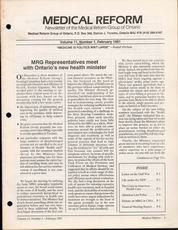
In this issue:
MRG Representatives Meet With Ontario’s New Health Minister - John W. Frank
Lively Discussion of Life Under NDP Government - Ulli Diemer
Abortion Law Policy - Mimi Divinsky
The MRG and the Crisis in American Health Care - Gord Guyatt
Book Review: Privatization of Health Care: The Case of Ontario Nursing Homes - Jane Aronson
Is Access to Health Care an Issue for MRG Members? - Dilin Baker, Kathy Hardill, Cathy Crowe
MRG Debated in Canadian Medical Association Journal
Primary Care, NDP Government Main Topic at MRG General Meeting - Ulli Diemer
See the February, 1991 issue of Medical Reform here.
Medical Reform newsletter April, 1991
Medical Reform Group Newsletter - April, 1991 - #
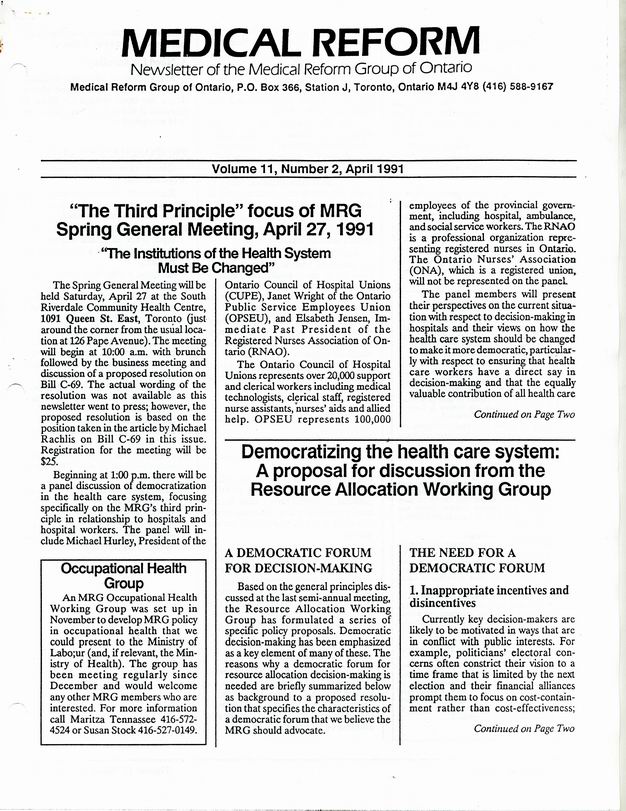
In this issue:
“The Third Principle” focus of MRG Spring General Meeting
Democratizing the health care system: A proposal for discussion - Resource Allocation Working Group
Summary of Presentation to the Standing Committee on Health and Welfare, Social Affairs, Seniors and the Status of Women - Michael Rachlis
Steering Committee Activities
Payment of Physicians - Michael Rachlis
About Chain letters, memberships, and surveys
Gulf statement called undemocratic - Fred Freedman
Meet aggression with force - Fred Freedman
Letter motivated by desire to avert war - MRG Steering Committee
Journal Review - Gord Guyatt
The view from Queen's Park - Dr. Bob Frankford, MPP
Foreign medical graduates seek recognition
Request for Assistance on Psychiatric Drugs/Withrawal - Don Weitz
The MRG and the State of Maine - Gord Guyatt
Groups join to fight for medicare - Rod Mickelburgh
Health-care crisis forecase in Mass.
Universal health care advocates look to Canada
Court overturns OHIP billing decision
See the April, 1991 issue of Medical Reform here.
Medical Reform newsletter August, 1991
Medical Reform Group Newsletter - August, 1991 - #
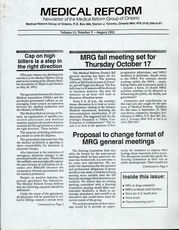
In this issue:
Cap On High Billers is a Step in the Right Direction
Patented Medicines Review Board - Joel Lexchin
College Looks at Physicians’ Relationship to Pharmaceutical Industry - Gord Guyatt
Relationship Between Health Science Faculties and the Canadian Pharmaceutical Industry - George D. Sweeney
Medical Residency Policy Concerning the Pharmaceutical Industry - Gord Guyatt
News Briefs Ulli Diemer
Meeting Explores Ideas for Democratizing Health Care - Ulli Diemer
Action for U.S. Health Plan Continues - Gord Guyatt
No Pot of Gold at the End of U.S. Rainbow, Doctors Warned
Black Marks Against Blue Cross
See the August, 1991 issue of Medical Reform here.
Medical Reform newsletter October, 1991
Medical Reform Group Newsletter - October, 1991 - #
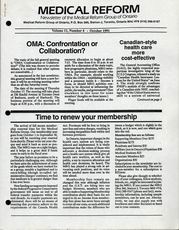
In this issue:
Canadian-Style Health Care More Cost Effective
More Questions than Answers... (sigh!) - Joel Lexchin
Steering Committee Activities - Ulli Diemer
The MRG and the OMA - Fred Freedman
Thoughts and Opinions on the OMA
Stop the War Against Women
See the October, 1991 issue of Medical Reform here.
Medical Reform newsletter December, 1991
Medical Reform Group Newsletter - December, 1991 - #
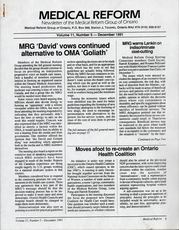
In this issue:
MRG ‘David’ Vows Continued Alternative to OMA ‘Goliath’ - Ulli Diemer
MRG Warns Lankin on Indiscriminate Cost-Cutting
Moves Afoot to Re-Create an Ontario Health Coalition
Letter to Health Minister
Reflection on Speaking Tour in the United States - Gord Guyatt
MRG in the USA - Haresh Kirpalani
Drug Licensing Changes May Be Imminent
Mothers’ Milk Threatened By Free Trade Pact
User Fees Lead to Two-Tiered Health Care - Mimi Divinsky
Time to Look at Medical Resource Management
Concern About Bill 135 - E.E. Daniel, Ph.D.
News Briefs - Ulli Diemer
OMA Debated at Fall Meeting - Ulli Diemer
Excellence in Medical Care Award
See the December, 1991 issue of Medical Reform here.
The Connexions Digest - Number 54
February 1992 - #

This was the last print issue of The Connexions Digest. One further print publication, the 1994 Connexions Annual, came out two years later.
Articles in this issue: We can save social programs; U.S. strikes drop dramatically; Privatization: Fiction vs. fact; Boreal forests in crisis; Throw it in the garbage myself; Moscow gangsters; Do you really want more censorship?; Libel law is dangerous; Aid cut; The junk food economy; We’re winning – Don’t ask where!; Native media surviving; Reform Party.
The New Resources section features materials on Arts/Media/Culture; Community, Urban, Housing; Development and International issues; Economy, Poverty, and Work; Education and Children; Environment, Nature, and Rural issues; Health; Human Rights and Civil Liberties; Lesbians/Gays; Native Peoples; Peace, Women, and Social Justice: General.
Also in this issue: Network News, News Briefs, Activist’s Bookshelf, and Classifieds.
Here is a scanned copy.
Medical Reform newsletter April, 1992
Medical Reform Group Newsletter - April, 1992 - #
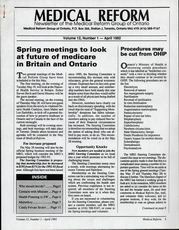
In this issue:
Spring Meetings to Look at the Future of Medicare in Britain and Ontario
Procedures May Be Cut from OHIP
Who Should Decide and How Should Decisions Be Made
MRG Comments On Policy Statements By Health Minister - Gordon Guyatt
Orser Commission Report Looks at Health Planning in South Western Ontario - Fran Scott
Midwifery in Ontario - Karyn J Kaufman RN
Organizational Changes in the Ministry of Health
Patients Without Health Cards Refused Service
Efficiency and Resource Allocation - Gord Guyatt
Administrative Costs in Health Care in Canada and the USA - Gord Guyatt
News Briefs - Ulli Diemer
See the April, 1992 issue of Medical Reform here.
Medical Reform newsletter May, 1992
Medical Reform Group Newsletter - May, 1992 - #
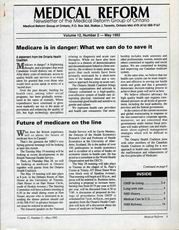
In this issue:
Medicare is in Danger: What We Can Do to Save It
Future of Medicare On the Line
Delisting - Haresh Kirpalani
Resource Allocation Questions
Proposed Delisting of Procedures - David Haslam
MRG Responds to Proposals to Re-Direct Long-Term Care
The National Health Service - Haresh Kirpalani
Steering Committee Activities
Medical Care in the USA: A Case of Terminal Disease - Haresh Kirpalani, Gord Guyatt
Changing the Last Dinosaur Analyzing the Reform of the National Health Service - Reg Race
See the May, 1992 issue of Medical Reform here.
Medical Reform newsletter September, 1992
Medical Reform Group Newsletter - September, 1992 - #
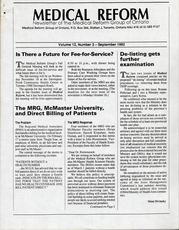
In this issue:
The MRG, McMaster University and Direct Billing of Patients - Gord Guyatt
De-Listing Gets Further Examination - Mimi Divinsky
Physician Resource Management: A Debate Which is Crucial to Future of Health Care
News Briefs - Ulli Diemer
See the September, 1992 issue of Medical Reform here.
Medical Reform newsletter November, 1992
Medical Reform Group Newsletter - November, 1992 - #
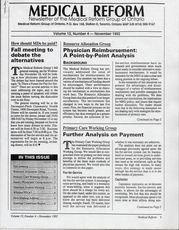
In this issue:
Physician Reimbursement: A Point-by-Point Analysis
Fall Meeting to Debate the Alternatives
Further Analysis on Payment
Family Physicians’ Group Looks at Alternate Payment Mechanism
Whither HSOs? - Rosana Pellizzari
Steering Committee Activities
See the November, 1992 issue of Medical Reform here.
Medical Reform newsletter December, 1992
Medical Reform Group Newsletter - December, 1992 - #
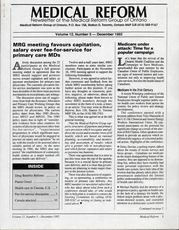
In this issue:
MRG Meeting Favours Capitation, Salary Over Fee-For-Service for Primary Care MDs - Ulli Diemer
Medicare Under Attack: Time for a Popular Campaign - Janet Maher
Drug Benefits Plan Undegoes Reform - Mitch Levine
Pharmaceuticals Bill Will Drive Up Costs
Patent Greed - Ruth Scher
Canadian Health-Care System Superior to U.S. Model, Group Told
MRG Debates How MDs Should Be Paid - Ulli Diemer
Attack on Canadian Health Care System Called Very Misleading - Gordon Guyatt, Haresh Kirpalani
See the December, 1992 issue of Medical Reform here.
Medical Reform Newsletter March, 1993
Medical Reform Group Newsletter - March, 1993 - #
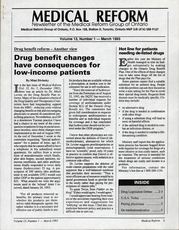
In this issue:
Drug Benefit Changes Have Consequences For Low-Income Patients - Mimi Divinsky
Science Suports Case for Brand Name Drugs
Higher Costs for Health Care, Higher Profit for Industry - Gordon Guyatt
USA Today: Organizing for Health Care - Rosana Pellizzari
National Health Care Gets Boost - Joan M. Mazzolini
Renumeration of Physicians: Another Opinion - J.V. Frei
De-Institutionaliation A Noble Concept That is Often Abused
Take Two Big Doses of Humanity and Called Me in the Morning
See the March, 1993 issue of Medical Reform here.
Medical Reform newsletter May, 1993
Medical Reform Group Newsletter - May, 1993 - #
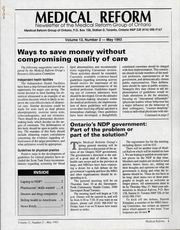
In this issue:
Ways to save money without compromising quality of care - Resource Allocation Committee
Ontario's NDP government: Part of the problem or part of the solution?
MRG - Lapdog to the NDP? - Haresh Kirpalani
Pharmacists' skills wasted - John Hill
Doctors, drug companies still blur guidelines
McMaster U. sets its own policy for residents
Canadian Health Officials Testify in Montpelier on Benefits of Single-Payer System
Marketing health care to Americans - Gord Guyatt
News Briefs
See the May, 1993 issue of Medical Reform here.
Medical Reform newsletter June, 1993
Medical Reform Group Newsletter - June, 1993 - #
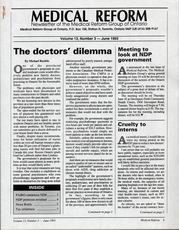
In this issue:
The Doctors’ Dilemmas - Michael Rachlis
Cruelty to Interns - Vera Tarman
PAIRO Condemns NDP Government’s “Assault On Freedom to Practice”
NDP’s Promises Revisited
News Briefs
Fair Shares
Ten Reasons to Oppose NAFTA
See the June, 1993 issue of Medical Reform here.
Medical Reform newsletter October, 1993
Medical Reform Group Newsletter - October, 1993 - #
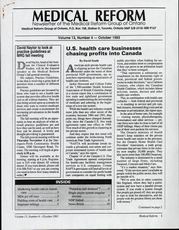
In this issue:
U.S. Health Care Business Chasing Profits into Canada
Marketing Health Care to Americans?
Who’s Padding the Costs of Health Care? - Ernie Lightman
Doctors Get Off Lightly, MRG Says - Gord Guyatt
Solving Improper OHIP Buildings - Gordon Guyatt, Haresh Kirpalani
Get Active in Health Care Battle, Reform Group Urges
Looking at Canada’s Health Care: It’s “Poised to Self-Destruct”
Canada’s Single-Payer Health Care Scheme A Singular Success - Gordon Guyatt, Haresh Kirpalani, Mimi Divinsky
NDP Government Flailed at June Meeting - Ulli Diemer
News Briefs - Ulli Diemer
Science Sells Out To Low Bid - Maude Barlow, David Noble
Timely House Call for Health System - Michael Rachlis
See the October, 1993 issue of Medical Reform here.
Medical Reform newsletter November, 1993
Medical Reform Group Newsletter - November, 1993 - #
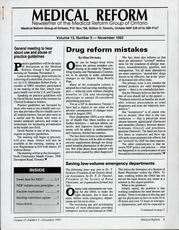
In this issue:
Drug Reform Mistakes - Mimi Divinsky
Saving Low-Volume Emergency Departments - Fletcher R.D.
Did Doctors Get a Sweet Deal from the Social Contract? - Rosanna Pellizzari, Gord Guyatt
Not All Doctors Got Off Lightly - Bob James
NDP Performance Diverges from Principles - Gord Guyatt
What Does Federal Election Mean for Medicare - Vera Tarman
Different Vision of Health Care - Steve Roedde, Janet McLeod
Steering Committee Update
News Briefs Ulli Diemer
Bitter Harvest in Vietnam
See the November, 1993 issue of Medical Reform here.
Medical Reform newsletter February, 1994
Medical Reform Group Newsletter - February, 1994 - #
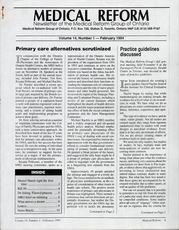
In this issue:
Primary Care Alternatives Scrutinized - Gord Guyatt
Practice Guidelines Discussed - Ulli Diemer
Marcel Masse Was Right the First Time - Bob Frankford
Bill 50: Tinkering With the Non-System
De-Listing: Flawed Process, Wrong Focus
MRG Critical of Proposed Delisting - Rosana Pellizzari and Mimi Divinsky
What Moves a Doctor
Bush Visit Protested
Prescription Drug Reform: Maybe Universality? - Bob Frankford
CHCs Defended - Dennise Albrecht
CHC Approach Long-Term and Preventative - Margot Morgan
HSOs Cost-Efficient and Progressive - Fred Freedman
Community Health Centres Not the Enemy - Rosana Pelizzari
On Liberals, Tories, and NPD - All Birds of a Feather - Haresh Kirpalani
News Briefs - Ulli Diemer
See the February, 1994 issue of Medical Reform here.
The Connexions Annual 1994
March 1994 - #
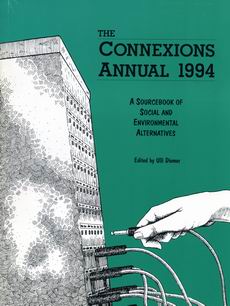
The 1994 edition of the Connexions Annual is subtitled “A Sourcebook of Social and Environmental Alternatives.” Edited by Ulli Diemer, it is 224 pages, and provides information about 1,800 groups and publications. It features a number of main sections: Arts/Media/Culture; Community/Urban/Housing; Development/International; Economy/Poverty/Work; Education/Children; Environment/Land Use/Rural; Health; Human Rights/Civil Liberties; Lesbians/Gays; Native Peoples; Peace; Women; Social Justice: General; Other Organizations of Interest; Alternative Periodicals; as well as a Name Index, Geographical Index, and Subject Index.
This was the last print publication produced by Connexions. By this time Connexions was already experimenting with putting content online. The Connexions.org website was launched in 1996. Among many other resources, it features an online directory of organizations.
Here is a scanned copy.
Medical Reform newsletter April, 1994
Medical Reform Group Newsletter - April, 1994 - #
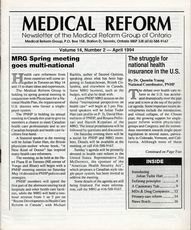
In this issue:
MRG Spring Meeting Goes Multi-National
The Struggle for National Health Insurance in the U.S. - Dr. Quentin Young
Julian Tudor Hart - Bob Frankford
Canadian Health Coalition Initiates Process to Define Principles for Health Care Reform - Stephen Leary
Draft Proposals Only: Principles for Health Care Reform
HSOs and CHCs: Divide and Conquer? - Bob James
Budget Consultation with Ontario's Treasurer - Gordon Guyatt
CMA’s ‘Anti-Doctor Bias’ Angers Some Doctors - Matt Borsellino
Academic Medicine and Pharmaceutical Industry: A Cautionary Tale - Gordon Guyatt
Doctors and Drug Companies in France - Jean-Michel Normand
Reform of Canada’s Primary Health Care System - John Forster, Walter Rosser, Maggie Grogan
News Briefs - Ulli Diemer
See the April, 1994 issue of Medical Reform here.
Medical Reform newsletter July, 1994
Medical Reform Group Newsletter - July, 1994 - #
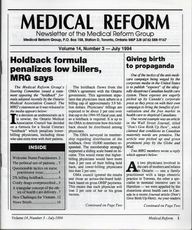
In this issue:
Holdback Formula Penalizes Low Billers, MRG Says
Giving Birth to Propaganda - Haresh Kirpalani, Rosana Pelizzari
The Political Use of Patients
Welcome Nurse Practitioners - Rosana Pellizzari
Questionable Tactics on Nurse Practioner Use - Alba Mitchell
2% Billing Holdback Undemocratic: MDs - Suzanne Morrison
Costly Drugs Overprescribed, Study Finds - Rod Mickleburgh
A Triangular Concept of the Ethics of Health Care Delivery: Access, Autonomy, and Cost Containment - Jason J S Barton
New Challenges for Vietnam - Jamie Uhrig
News Briefs - Ulli Diemer
See the July, 1994 issue of Medical Reform here.
Medical Reform newsletter September, 1994
Medical Reform Group Newsletter - September, 1994 - #
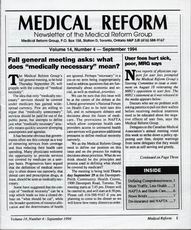
In this issue:
Fall General Meetings Asks: What Does “Medically Necessary” Mean? Ulli Diemer
User Fees Hurt Sick, Poor, MRG Says
Getting to the Core of Comprehensiveness - Rosana Pellizzari
How Should We Decide Where Resources Should Go?
More Traffic Means Less Health - James Munro
Health Care and Nafta - Cindy Wiggins
News Briefs - Ulli Diemer
NAFTA and De-Insurance
See the September, 1994 issue of Medical Reform here.
Medical Reform newsletter December, 1994
Medical Reform Group Newsletter - December, 1994 - #
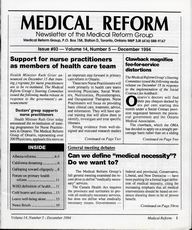
In this issue:
Support for Nurse Practitioners as Members of Health Care Team
Clawback Magnifies Fee-For-Service Distortions
Can We Define “Medical Necessity”? Do We Want To?
Quicker Care is Better Care - Gordon Guyatt, Murray Enkin
Eight Alberta Horror Stories
The Alberta Experiment - Kathleen Connors
The MRG and Health Care Reform in the United States - Gordon Guyatt
California Dreaming: A Fall Reflection from an American Health Care Reformer - Clifford Rosen
Galloping Toward Oligopoly: Giant H.M.O. ‘A’ or Giant H.M.O. ‘B’? - Steffie Woolhandler, David Himmelstein
Forum on Primary Health Reform
Completely Healthy, Utterly Unattainable?
Cold Hearts and Coronaries
Leave Well-Being Alone - David Seedhouse
General Meeting Tackles “Medical Necessity” - Ulli Diemer
News Briefs - Ulli Diemer
See the December, 1994 issue of Medical Reform here.
Medical Reform newsletter April, 1995
Medical Reform Group Newsletter - April, 1995 - #
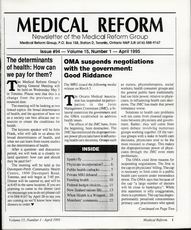
This was the last issue of the Medical Reform newsletter which I put together. In April 1995 I left the Medical Reform Group in order to take on a job at Sources.
In this issue:
OMA Suspends Negotiations With the Government: Good Riddance
Ontario Medical Association’s “Social Contract Days” Penalize Patients
Sparks Fly Call to Lobby Patients
Family Physicians Group Encourages Unethical Behaviour in Its Members
College of Family Physicians Responds to MRG Media Release
Doctor-Patient Relationship Shouldn’t Be Used for Politicking - Mimi Divinsky, Gord Guyatt, Rosana Pellizzari
GPs Urged to Fight Nursing Plan
Incorporation for Ontario Physicians
Public Health Services are Essential Services
Aberman, Rachlis Face Off Over Ontario Health-Care Funding
Maintain the Principles of Equal Access Regardless of Income
Ensuring a Healthy Canada: Where Should the Money Come From?
Federal Budget Makes Tragic Choices for Canada’s Future
New Zealand Government Rations Life and Death With Attack on Health Care
Warning: This Budget is Dangerous to Your Health
Will the Liberal Government Betray Medicare?
The Eugenics of Health Care in the U.S.
Privatization Not the Answer - Bob Frankford
Draft Policy on Insured Services
Ten Steps to Better Health in Canada by the Canadian Health Coalition
When Health Becomes a Weapon
Medicare Under the Knife
See the April, 1995 issue of Medical Reform here.